
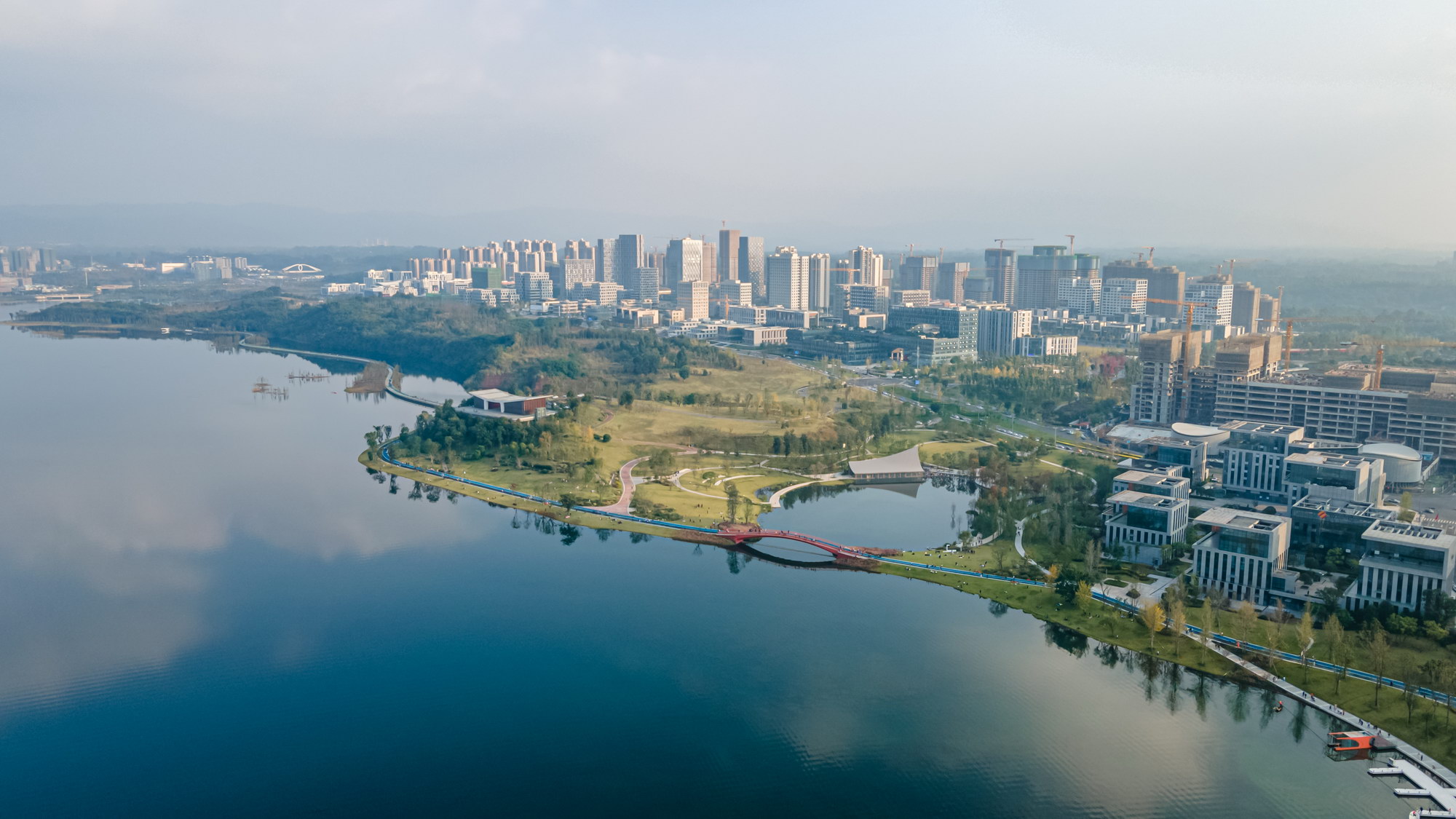
▲鸟瞰湖畔森林图书馆
项目位于成都市天府新区兴隆湖畔。设计主旨意在以公园城市为前提的城市布局下,为提高城市活力,扩大公园开放界面,提供与周边场地便捷的连接通道。串联水体、绿地、城市视线,营造多层次城市景观空间,吸引市民更广泛的关注与参与,激发城市区域活力。
The project is located on the bank of Xinglong Lake in Tianfu New District, Chengdu. The design aims to imbue the city with vitality, expand the open area of the park, and provide convenient connection channels with surrounding sites under the urban layout premised on the park city. The whole project connects water bodies, covers green spaces, and offers urban sight for the public to create a multi-level urban landscape, aiming to attract more extensive attention and participation of citizens, thus stimulating the vitality of urban areas.
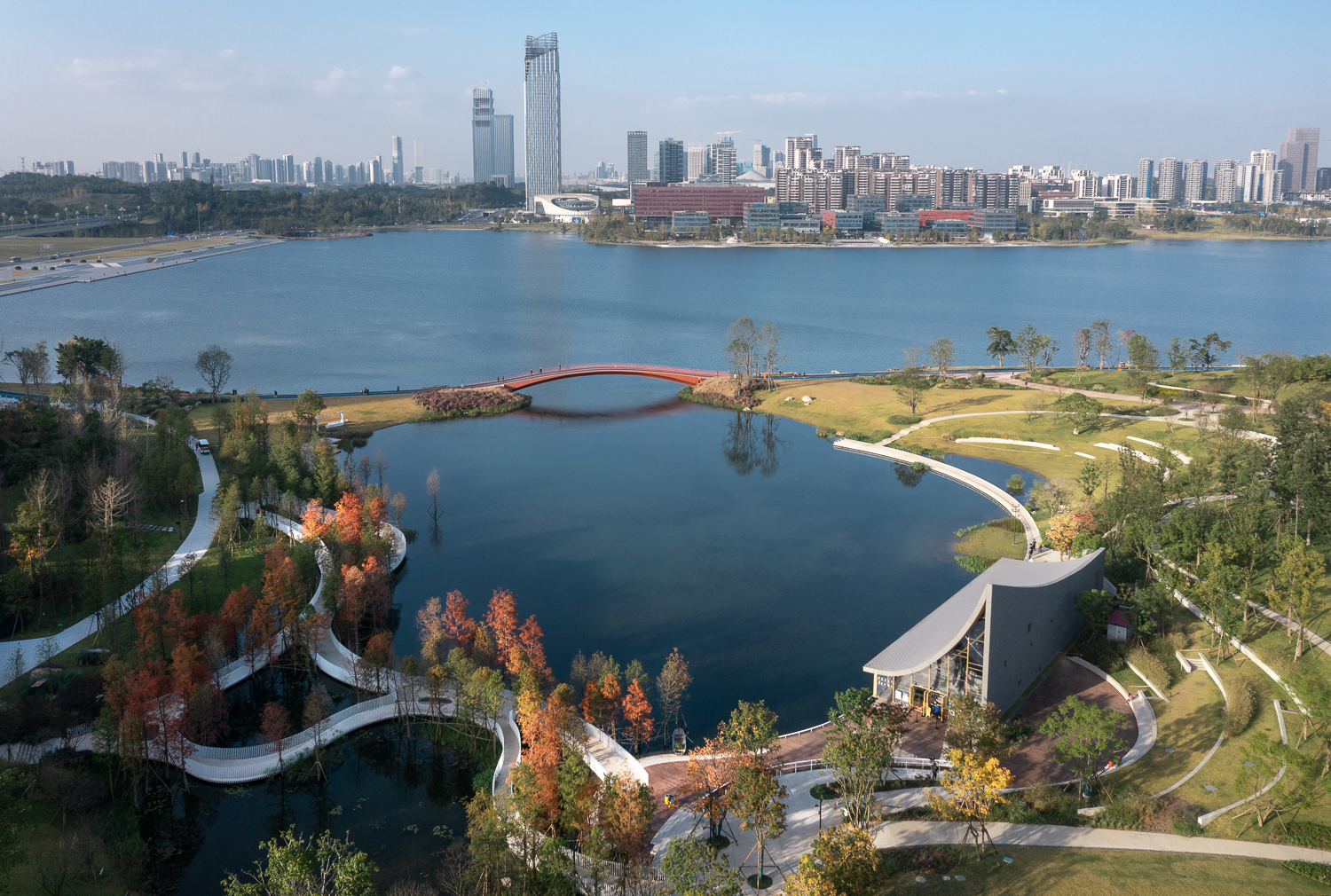
▲从湖畔森林图书馆望向兴隆湖
湖畔森林图书馆位于兴隆湖西南侧内湾口,环境面积约6万平方米。初始场地是一片围绕着兴隆湖南侧内湖周边展开的公园绿地。区域内岸线均为陡坡入水,岸带植物生长旺盛,但临水区域缺乏开敞面,且内湖区内水体较浑浊,整体缺少观水赏水亲水的界面。区域内的交通也待优化。
Nestled at the mouth of Neiwan on the southwest side of Xinglong Lake, the lakeside woods library covers an area of around 60,000 square meters, whose original venue enshrouds the park green space that revolves around the inner lake on the south side of Xinglong Lake. The shoreline in the area is steep slope for water to flow, with plants flourishing vigorously by the shore. However, the waterfront area lacks an open surface, and the water body in the inner lake area is turbid, therefore lacking the overall interface for people to admire, view and touch the water. That aside, traffic in the area remains to be refined.
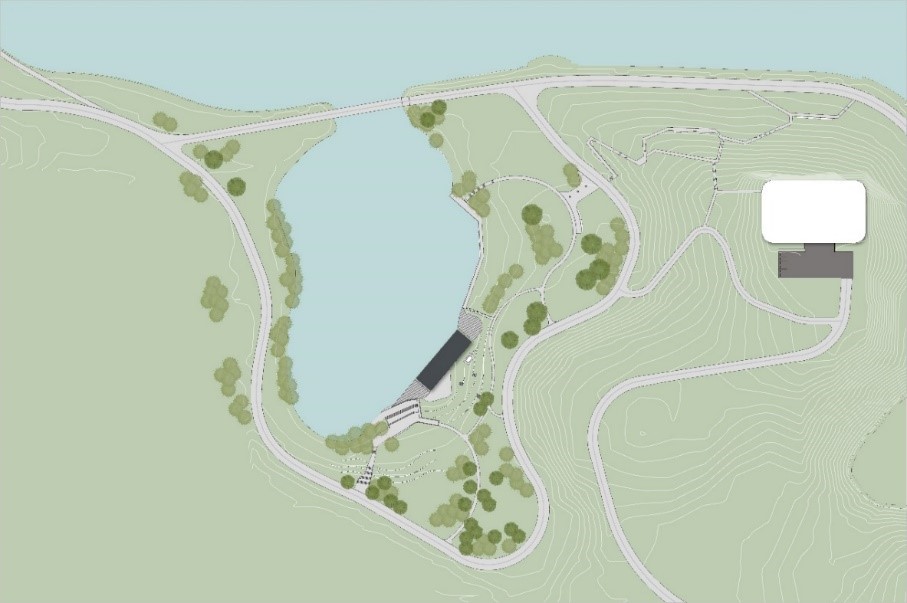
▲原始平面
水
Water
兴隆湖在设计规划之初,选址鹿溪河最大滞洪泄洪区,因地制宜打造成4500亩的自然生态湖区。通过新建泄洪道实现河湖分离,利用现状地形构建高滩湿地和生态湖泊。洪峰过境鹿溪河上游高滩湿地,湿地发挥滞洪泄洪功能,全面提升鹿溪河下游及兴隆湖大湖区的防洪标准。同时大湖区也会在历史高水位时期,承担一定的分洪功能。
During its initial design and planning, the Xinglong Lake chose the largest flood detention and discharge area of the Luxi River as its building site, in which there exists a natural ecological lake area of 4,500 mu revamped according to local conditions. The separation of rivers and lakes is realized by building new floodways, and high-beach wetlands and ecological lakes are constructed by using the existing terrain. The flood peak passes through the high-beach wetlands in the upper reaches of the Luxi River, and the wetlands serve as the guarder of flood detention and discharge, which altogether comprehensively improving the flood prevention standards in the lower reaches of the Luxi River and the Great Lake area of Xinglong Lake. At the same time, the Great Lakes region will also assume a certain flood distribution during the high water level period in history.
所以,在设计之初,我们面临的问题是,如何在内湖17500㎡的范围内,设计一个能够保证小水域内水体常效自净化的可行方案。
There, our challenges during its initial design is how to device a practicable scheme that can ensure the regular self-purification of water bodies in small water areas within the area of 17,500 square meters of the inner lake.

我们的策略是,首先,在内湖通过打造清水型湿地系统,将区域内水体自净化作为前提;其次,依据水量平衡计算结果,于环湖绿道桥下设置一处溢流堰,将内湖水域水位提升,高出大湖区15-20cm。使区域水体库容增加3400立方,蓄水、养水功能增加,大大提升了雨洪季节水体调节功能,提升了生态系统稳定性。同时在一定程度上与大湖区隔离,杜绝了大湖区污染物或入侵物种对湖畔书店水域生态系统的冲击,隔绝外源污染的同时提升了系统的自净能力。
We adopted many strategies. Firstly, with the self-purification of water bodies within the areas as the requisite, fostering a wetland system that is imbued with lucid water. What’s more, according to the calculation results of the water balance, an overflow weir was set up under the greenway bridge around the lake to raise the water level of the inner lake to 15-20cm higher than that of the Great Lakes area, increasing the regional water reservoir capacity by 3400 cubic meters. As a result, its capacity of storage and cultivation of water refines a lot, which greatly improves the water regulation function during the rain season and at the same time the stability of the ecosystem. Meanwhile, it is isolated from the Great Lakes region to a certain extent, eliminating the impact of pollutants or invasive species on the ecosystem of the lakeside bookstore in the Great Lakes region, isolating foreign sources of pollution while at the same time improving the self-purification capacity of the system.
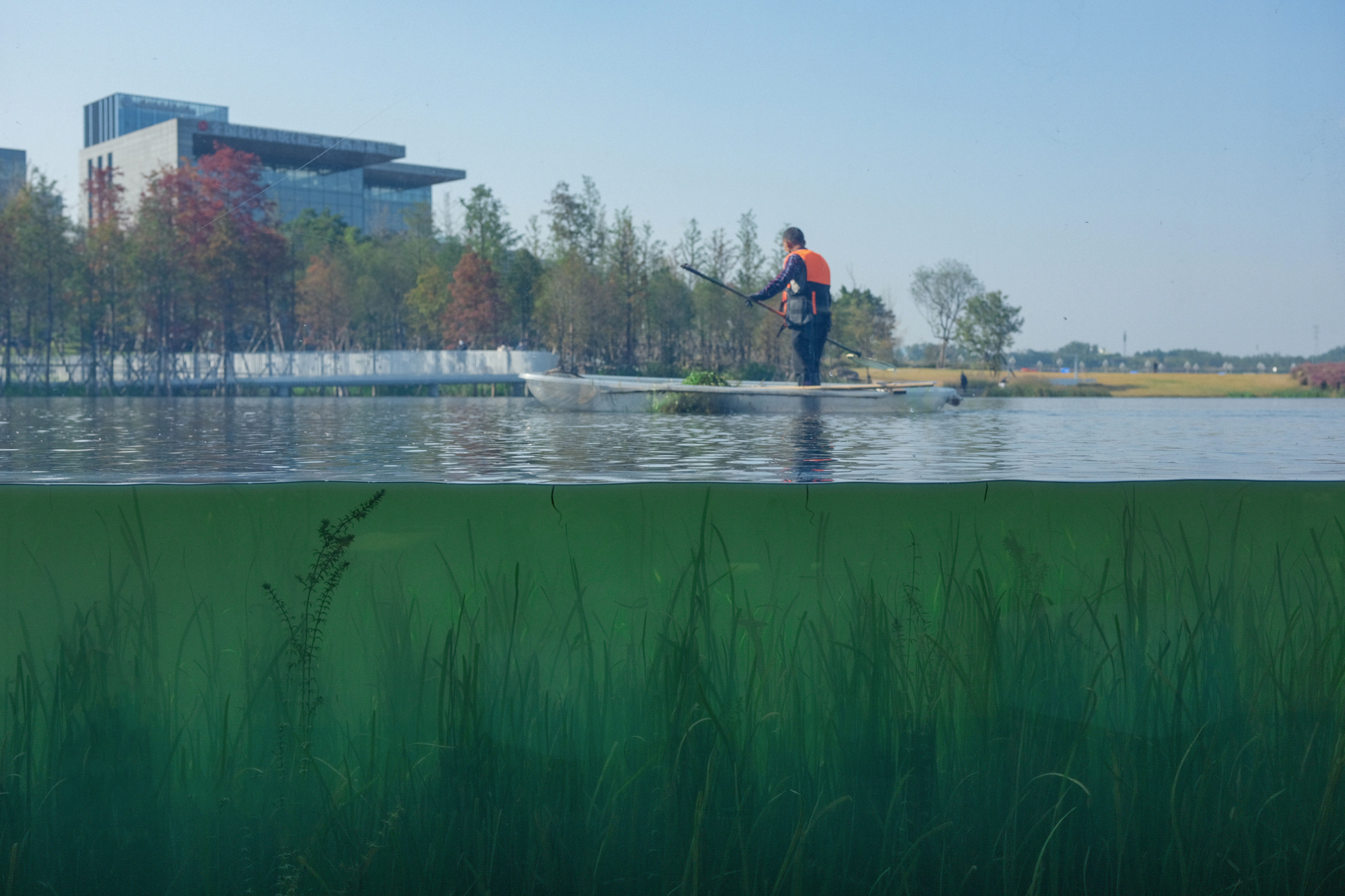
▲改造提升后,生机勃勃的水下森林效果
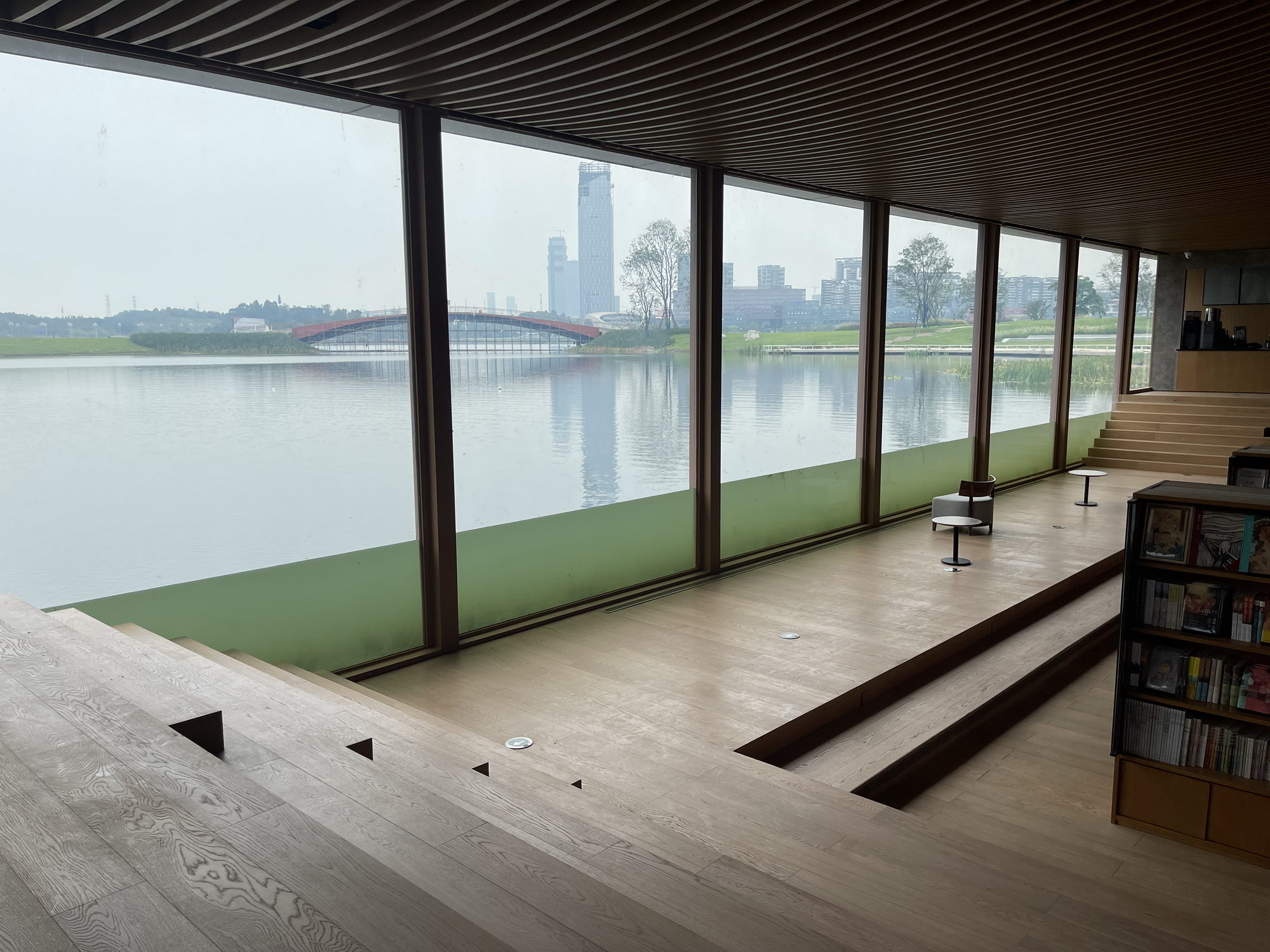
▲施工完成初期水质效果
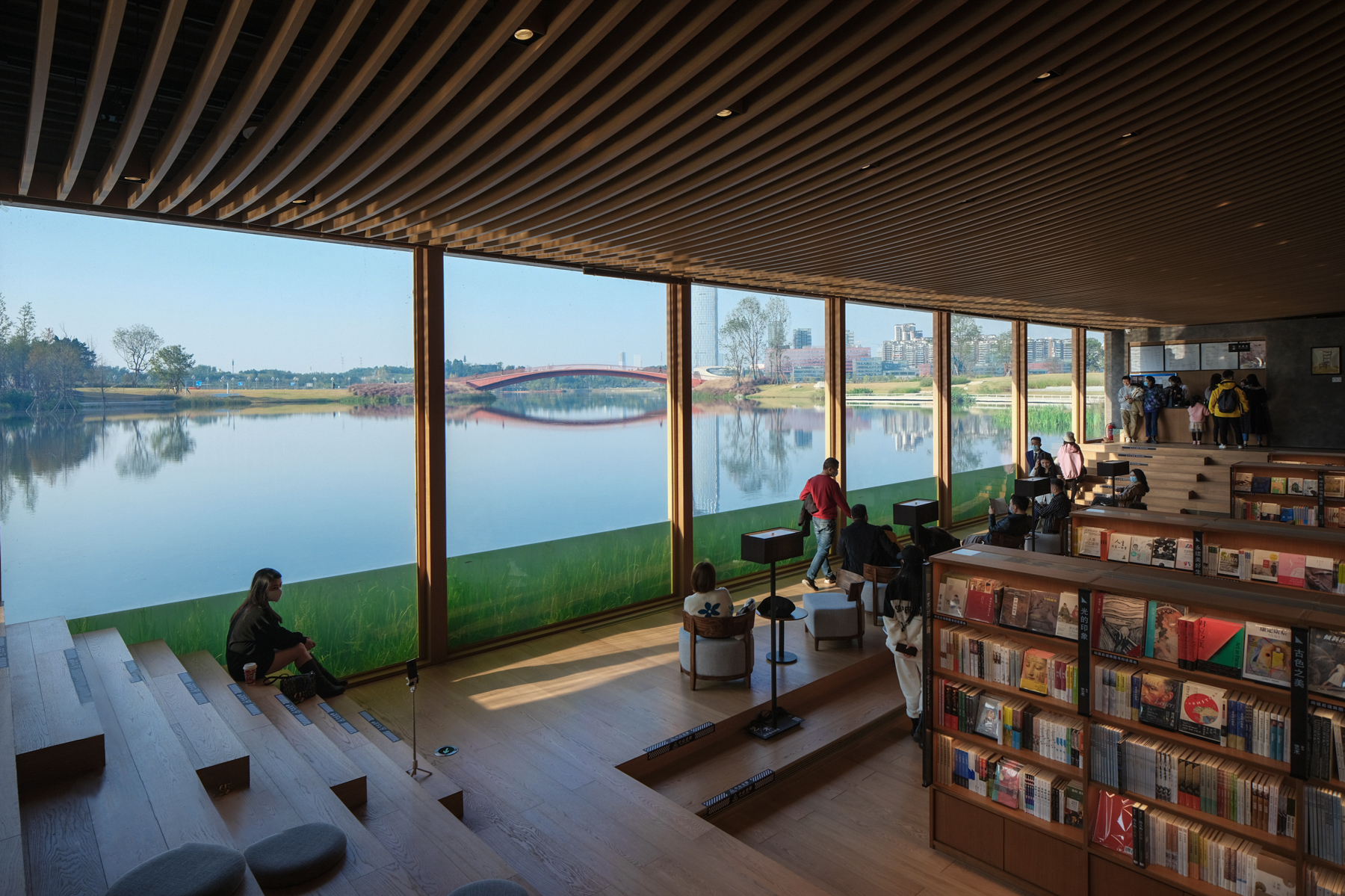
▲施工完成后两个月后水质净化效果
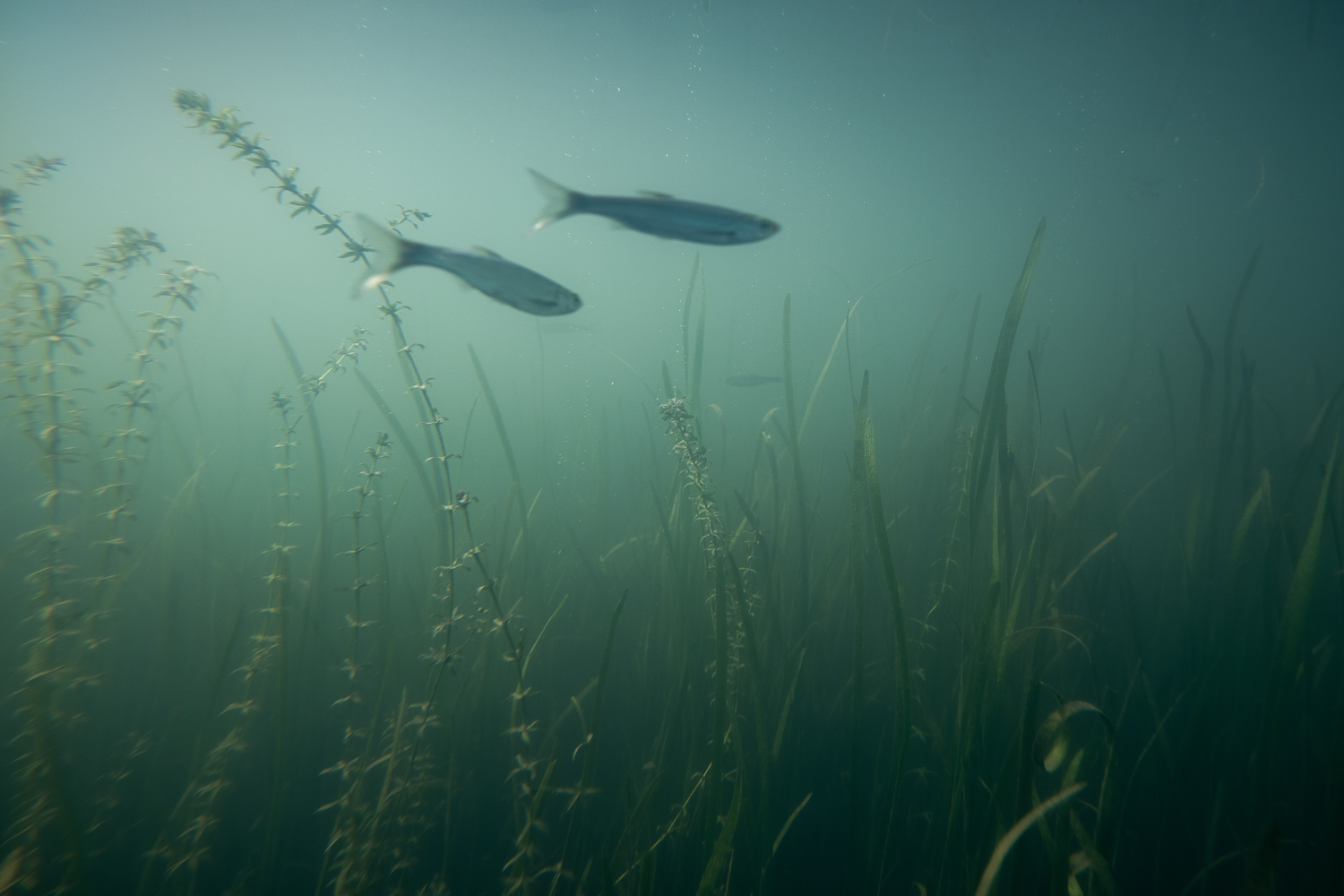
▲水下生态系统
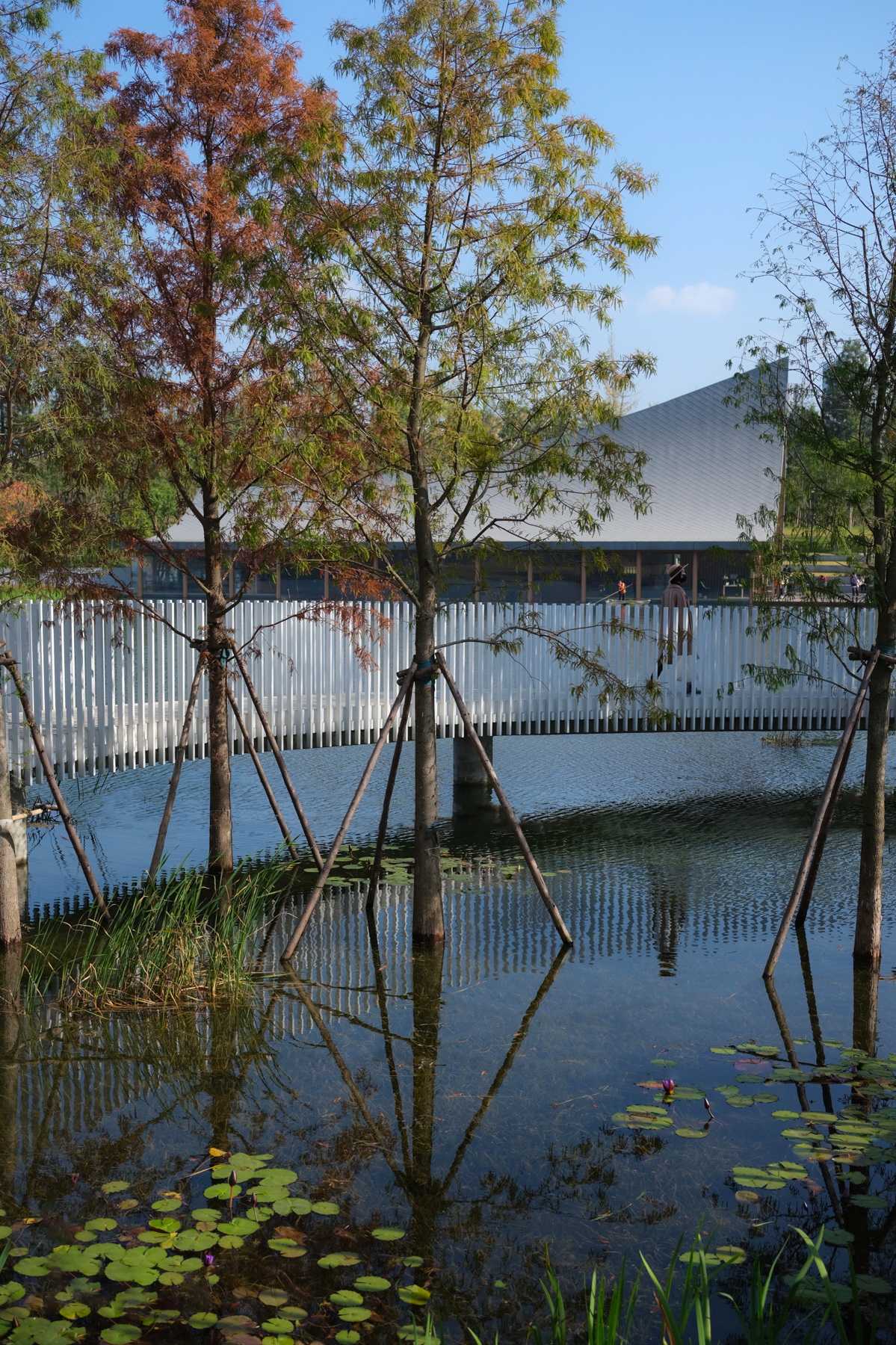
▲湿地水体效果
森林图书馆
Woods Library
在内湖的小水域周边,将书店室内功能空间向外部空间做延展,将公园中的内湖、草地、树林、湿地等场景空间与阅读主题串联,提供更多可参与可游玩可参与的场地。
The functional space of bookstore on the periphery of the small waters in the inner lake will expand for more - to intertwine inner lake, grassland, woods and wetland with reading, thus offering more venues for participation and entertainment.
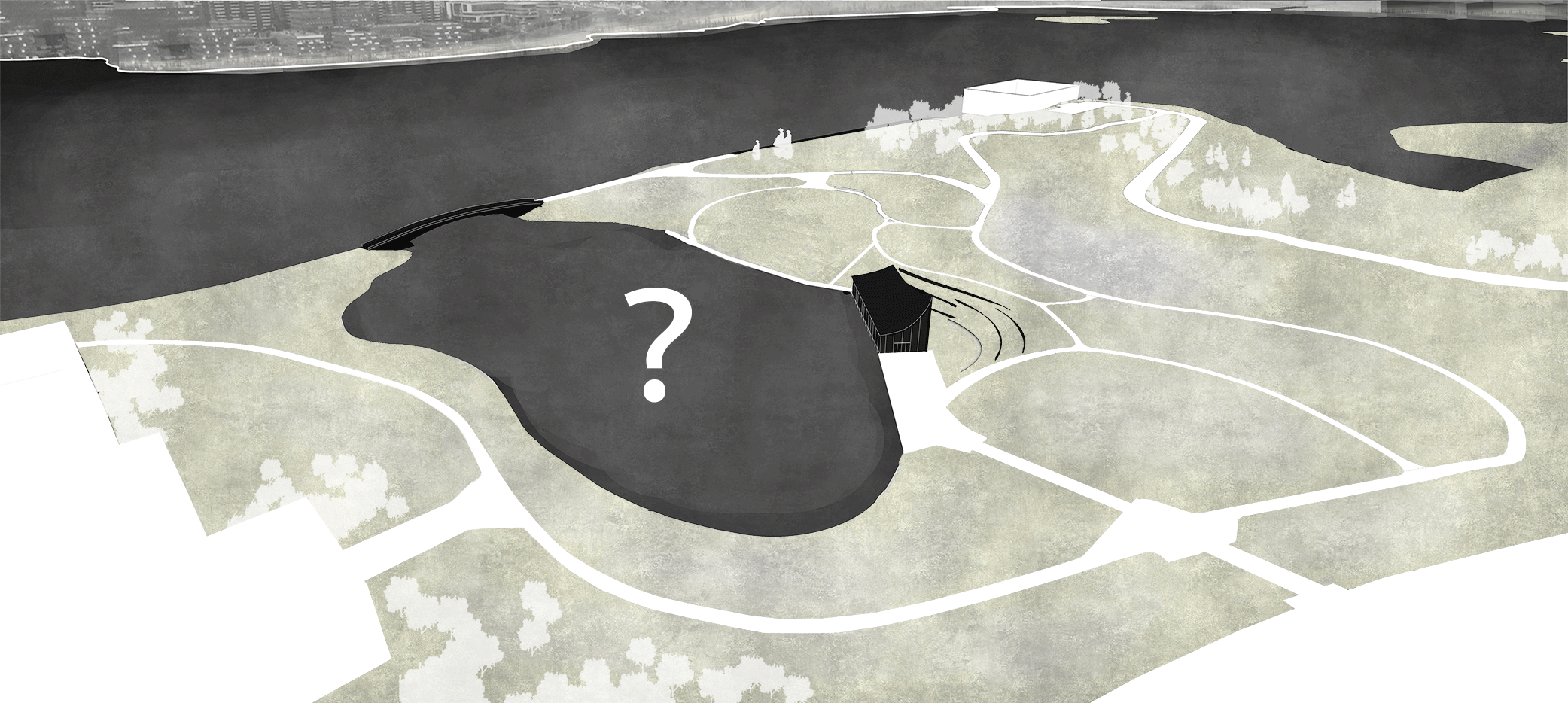
在林间、在水畔、在波光粼粼的湖面上,用空间和环境将文学的氛围进行渲染,设置更便于市民休憩的多处区域,形成不同的使用空间,或是三两伴读、或是小型沙龙、展演,都将书店周边场地区域得以充分展开,形成主题氛围浓厚的湖区一隅。
The ambience of literature is rendered with space and environment in the forest, on the water's edge and on the sparkling lake surface. That aside, multiple areas are established so that there will be more facilities for citizens to rest, forming different spaces, including places for people to read together, small salons and exhibitions, all of which will be fully expanded around the the bookstore, forming a wonderful corner of the lake with a strong theme ambience.
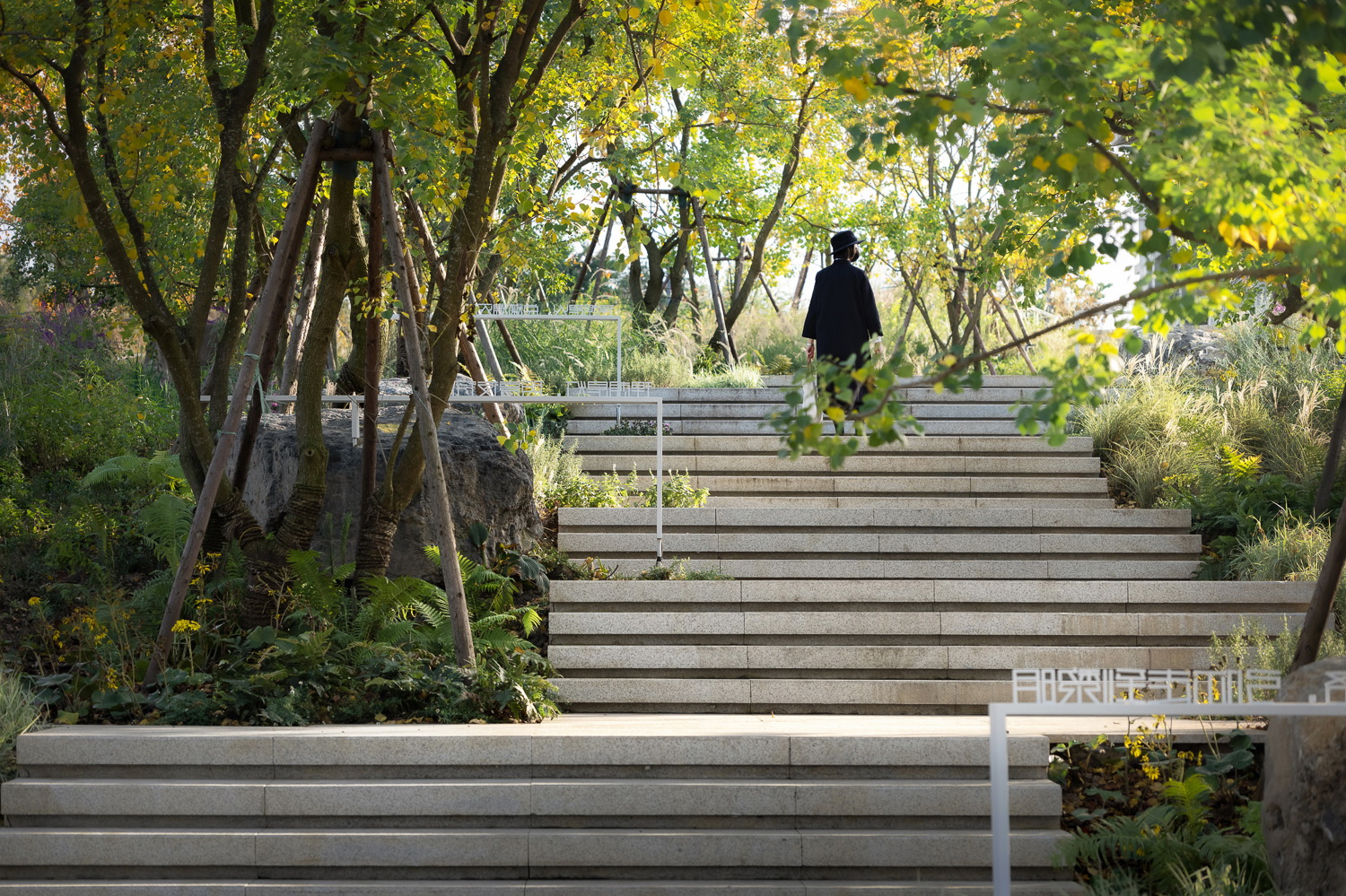
▲流沙河先生《理想》诗歌走廊
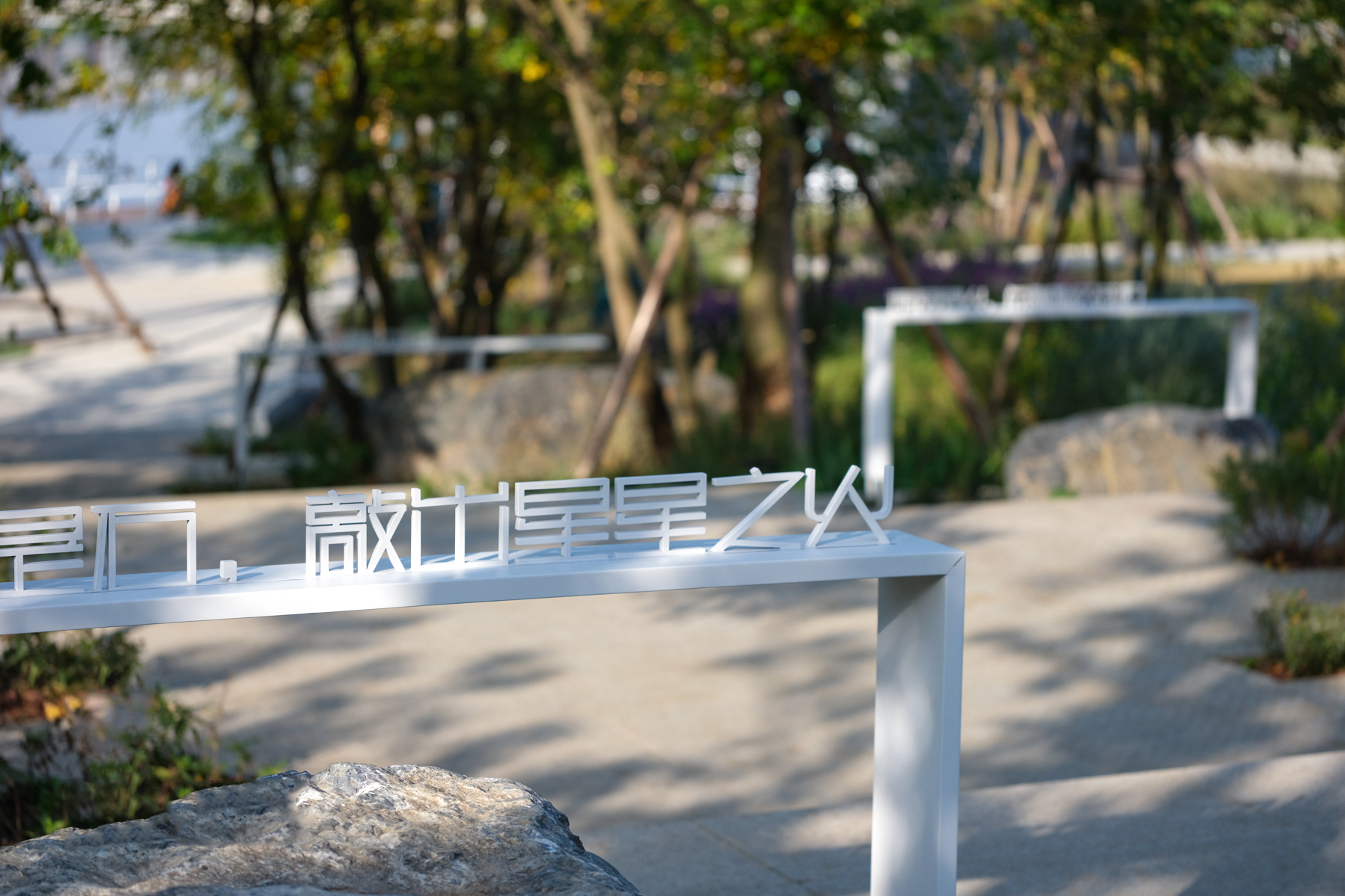
▲诗歌走廊
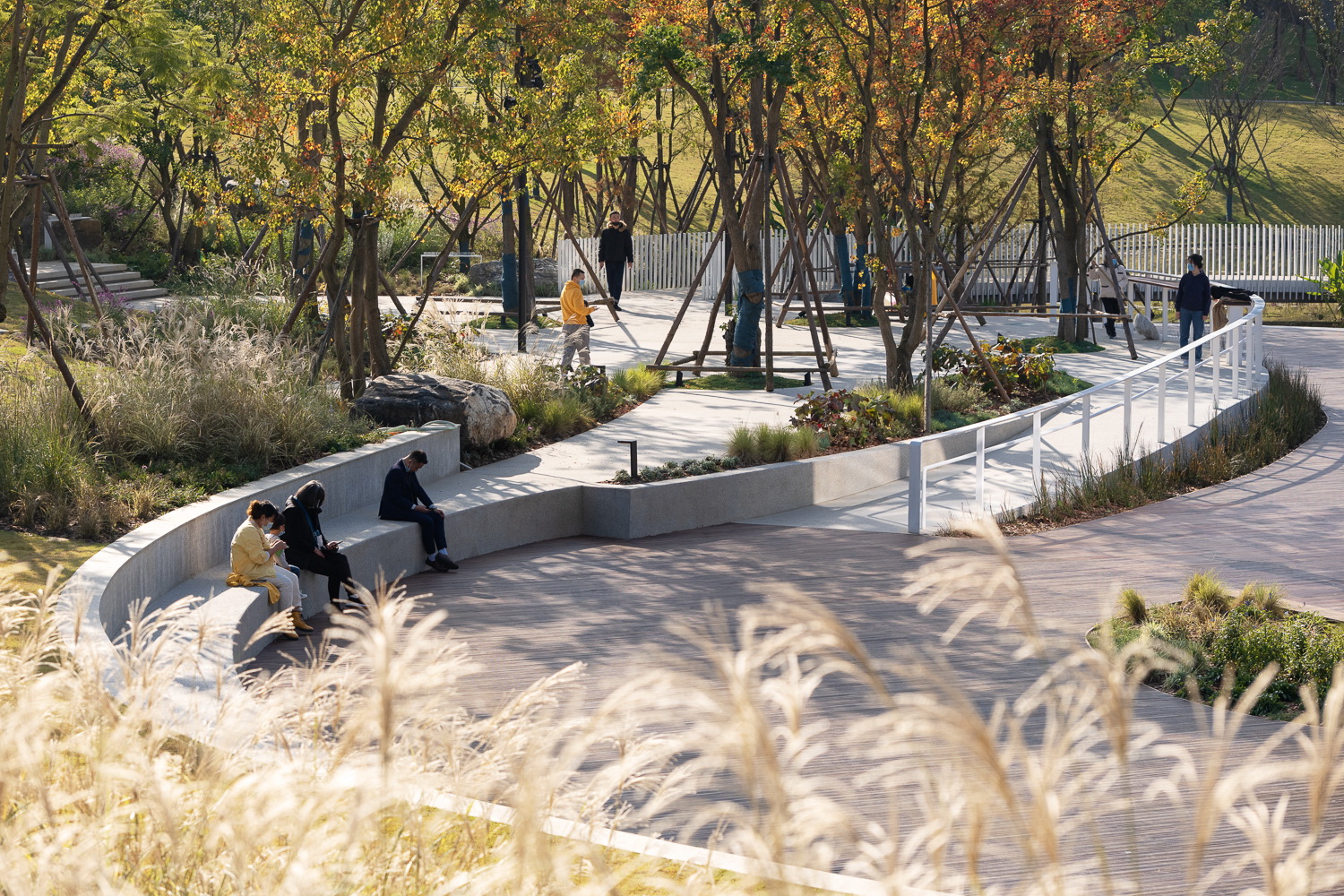
▲阳光下,书店外休息的人们
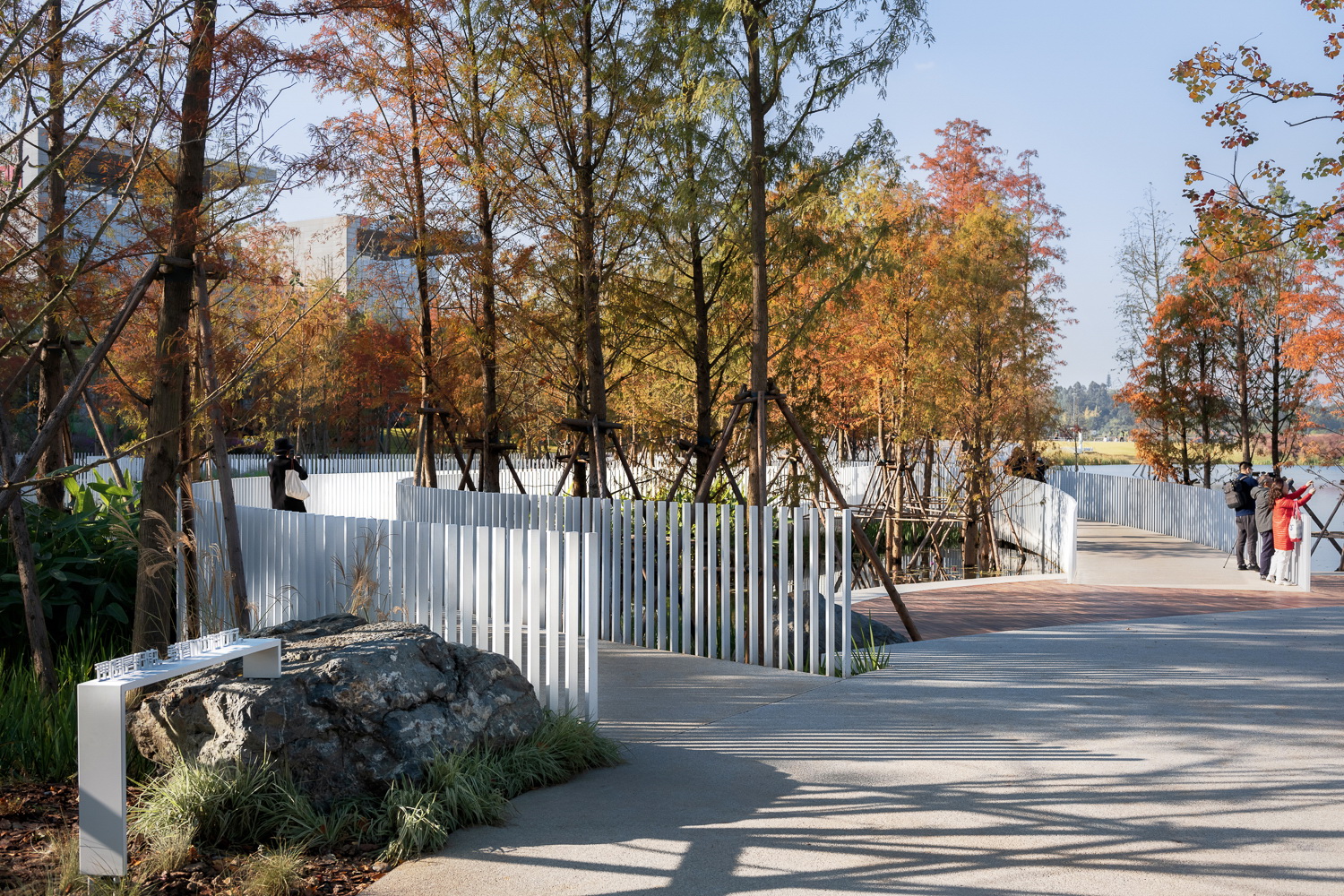
▲人行桥出发平台
人们游走在林间沙龙、观湖书吧、环形滨水舞台、线型生态走廊等,感受不同空间距离观赏水下书店建筑,或是感受自然、亲近水体的各种活动。
People meander through the the forest salon, lake-view book bar, circular waterfront stage, linear ecological corridor and other facilities to fully embrace the underwater bookstore architecture at different distances, or they can experience various activities of nature which can touch the water body in flesh.
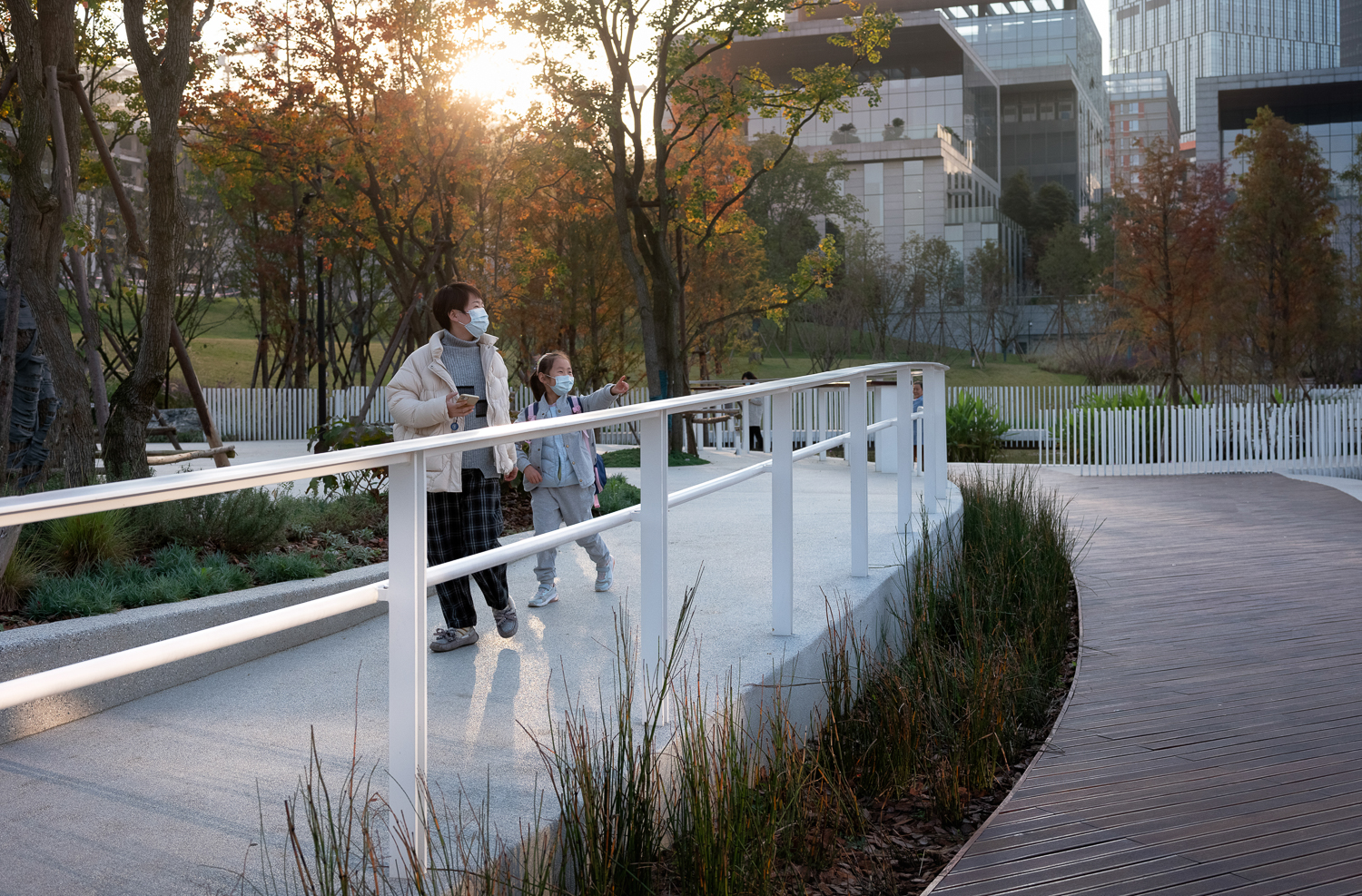
▲游赏的人们
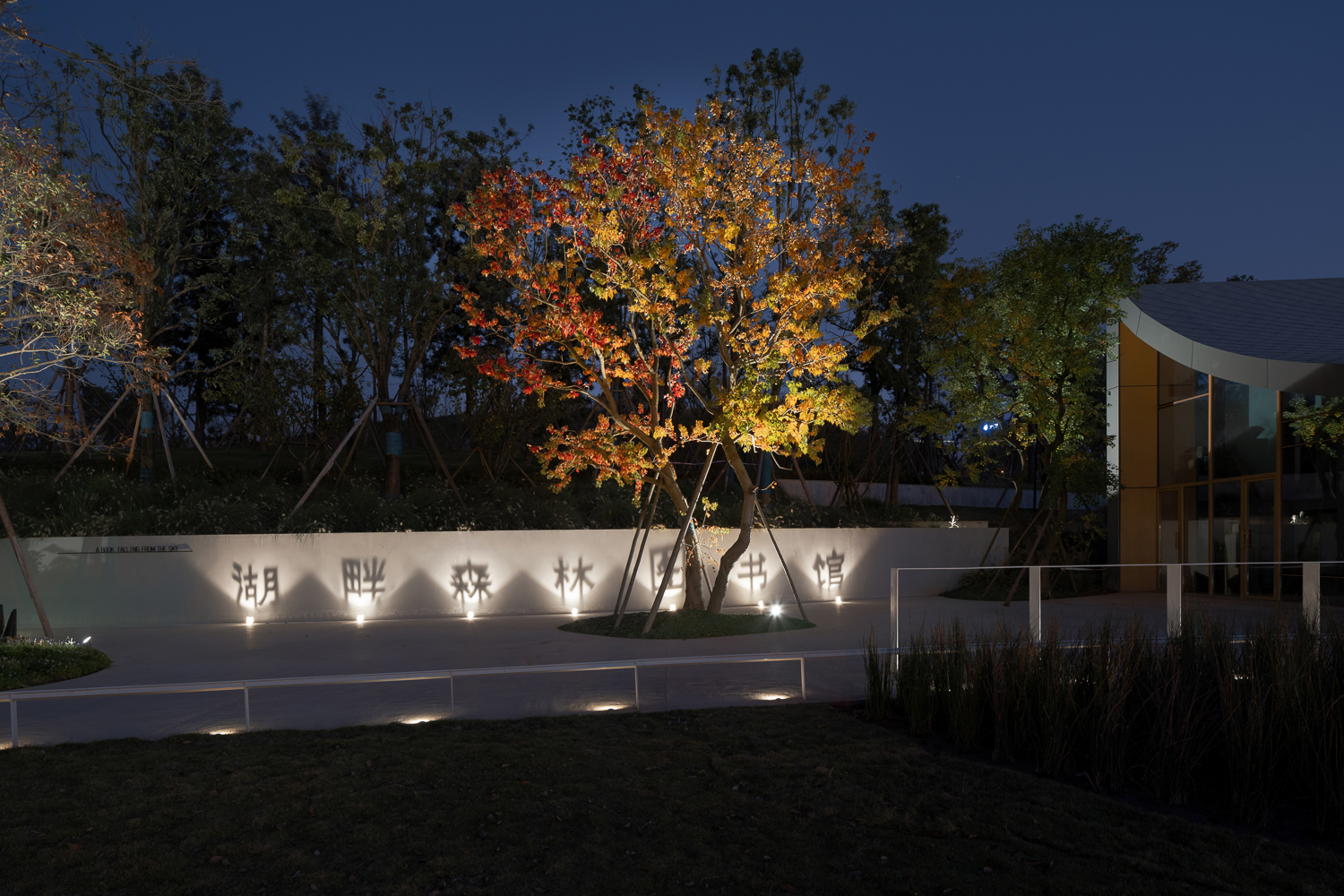
▲湖畔森林图书馆灯光设计墙
林
Forest
主题书店建筑临水而建,我们则考虑在建筑物后方垂直空间上形成具有弧度的林冠线,与建筑屋脊反向起伏,相互呼应。从环湖步道拱桥远眺,在空间上呈现出建筑物与湖水被森林轻柔地环抱的势态。将原有较为随意的林木梳理整合,尊重场地坡型,引入银杏、落羽杉、乌桕等季相丰富的落叶乔木,连同现场原生银桦、香樟等高大常绿乔木撑起天际线。
In light that the unique bookstore of forest theme building is erected by the water, we contemplate forming a curvature canopy line in the vertical space behind the building, which undulates in the opposite direction to the roof ridge of the building, interacting with each other. Looking from the arch bridge of the promenade around the lake, people will witness space that the buildings and the lake are gently enshrouded by the forest. The original more casual trees were combed and integrated. Considering the slope of the site, we introduced deciduous trees with rich seasons such as ginkgo, deciduous cedar and ebony, together with tall evergreen trees such as silver birch and camphor native to the site, to uphold the skyline.
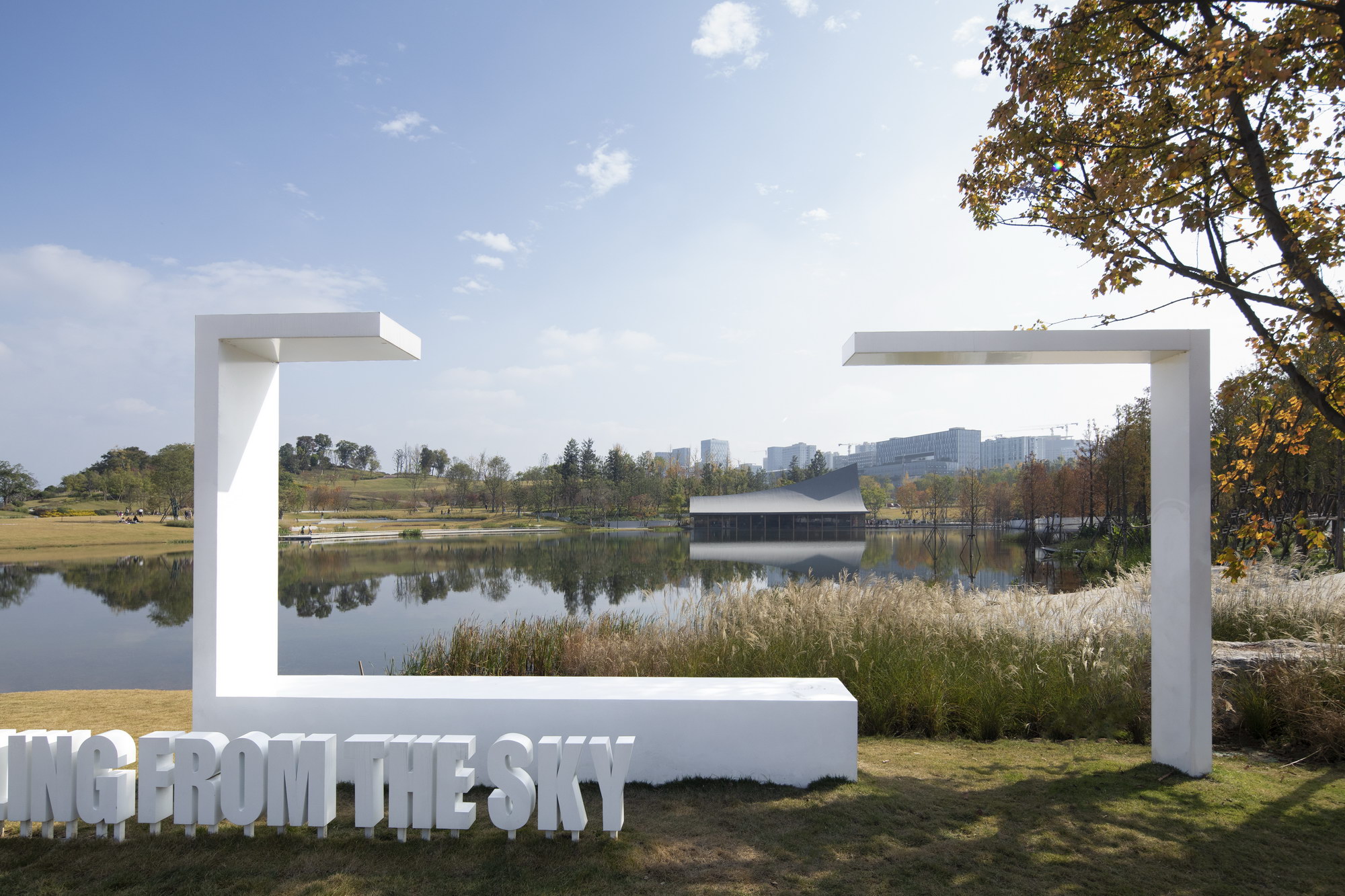
▲书店正对面设置的一处打卡框景
步行道在水中生长的片植落羽杉林中穿梭,游人的视线随林带的疏密变化而带来步移景异的观赏视角,也能近距离观赏近岸水生植物群落。
The promenade track weaves through the fallen cedar forest growing in the water. Visitors can see the scenery from distinct perspectives as the forest belt alters. That aside, they can also admire the aquatic plant community near the shore up in a rather close distance.
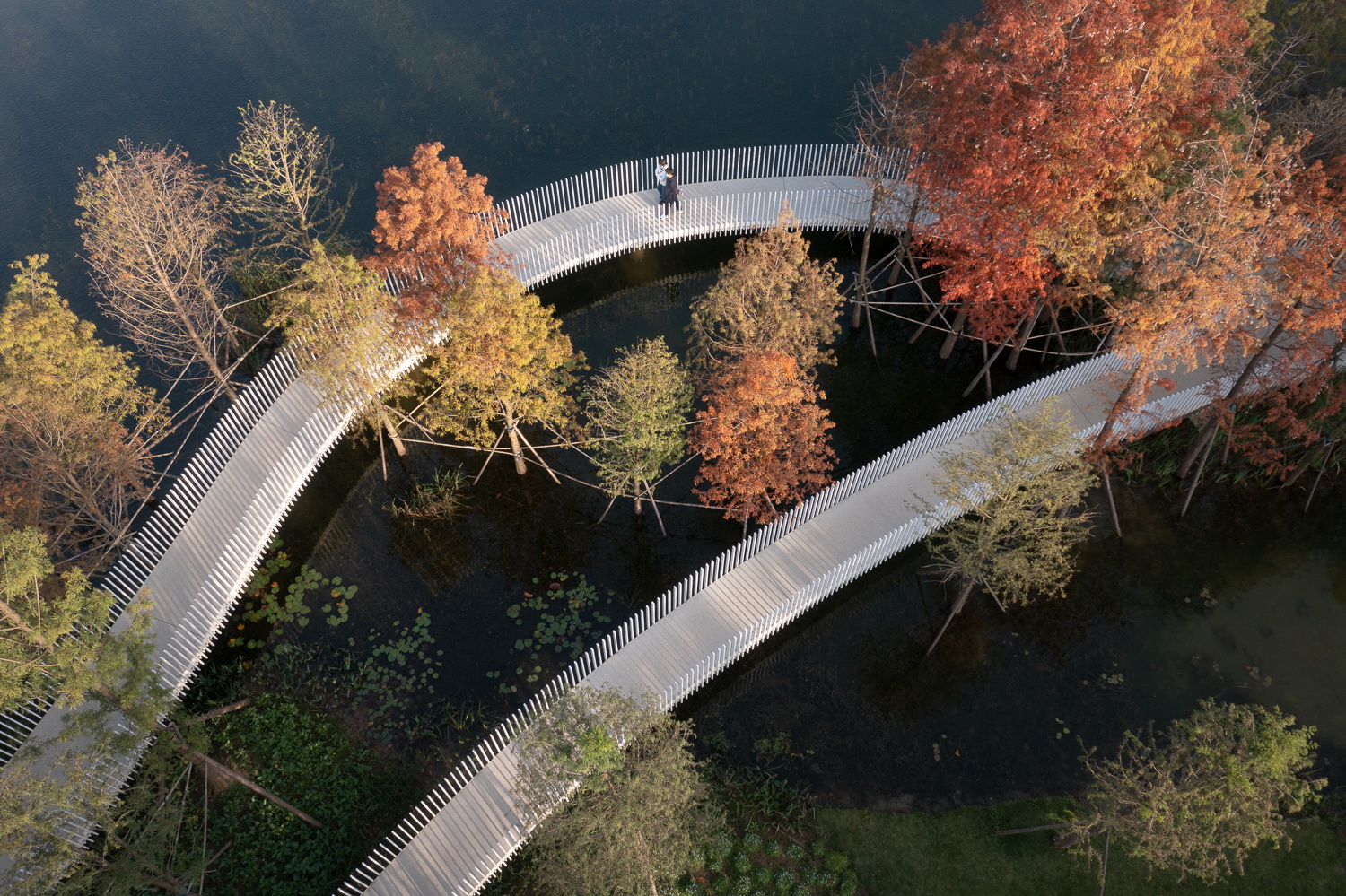
▲白桥穿林间
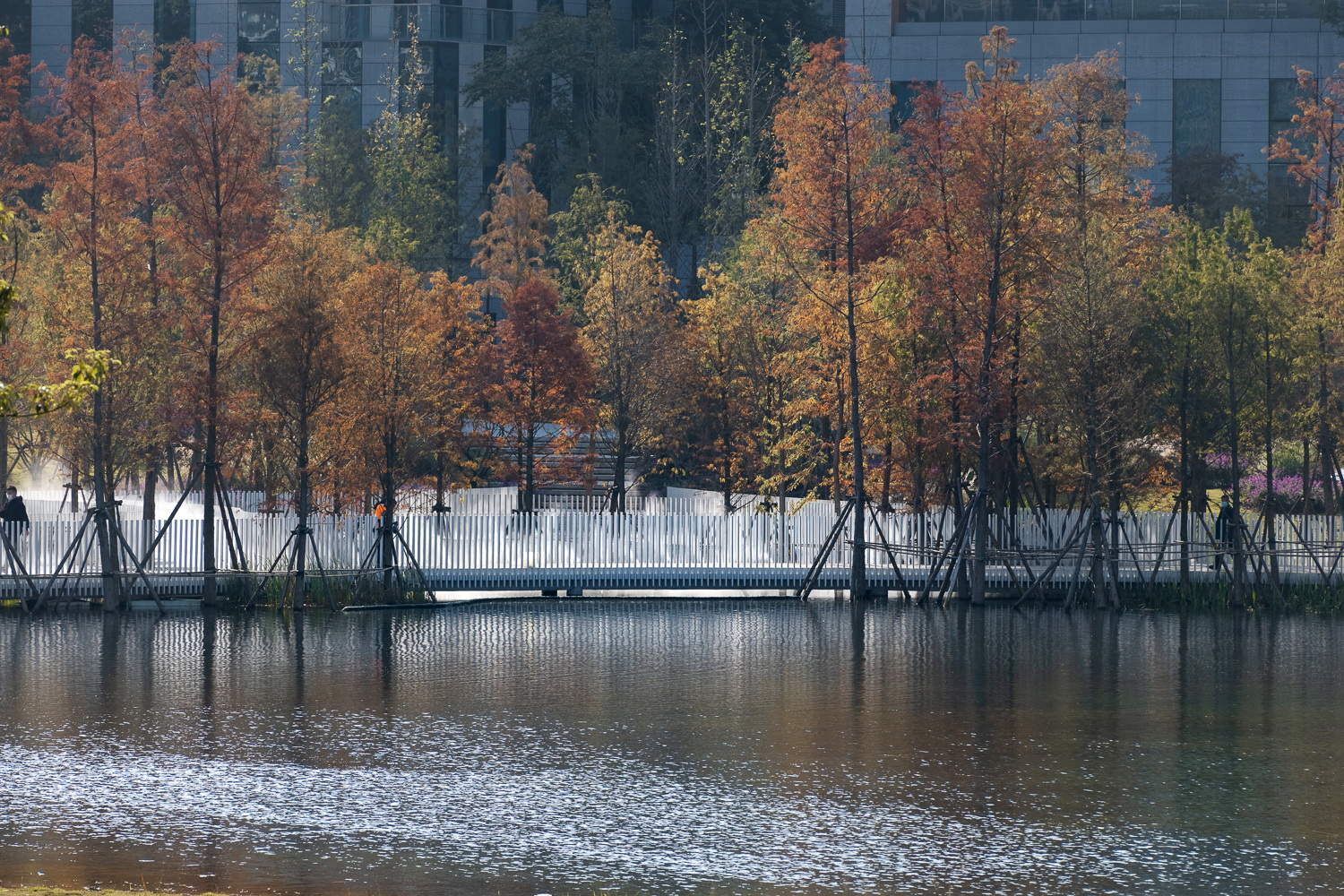
▲行走在彩林清波中的人们
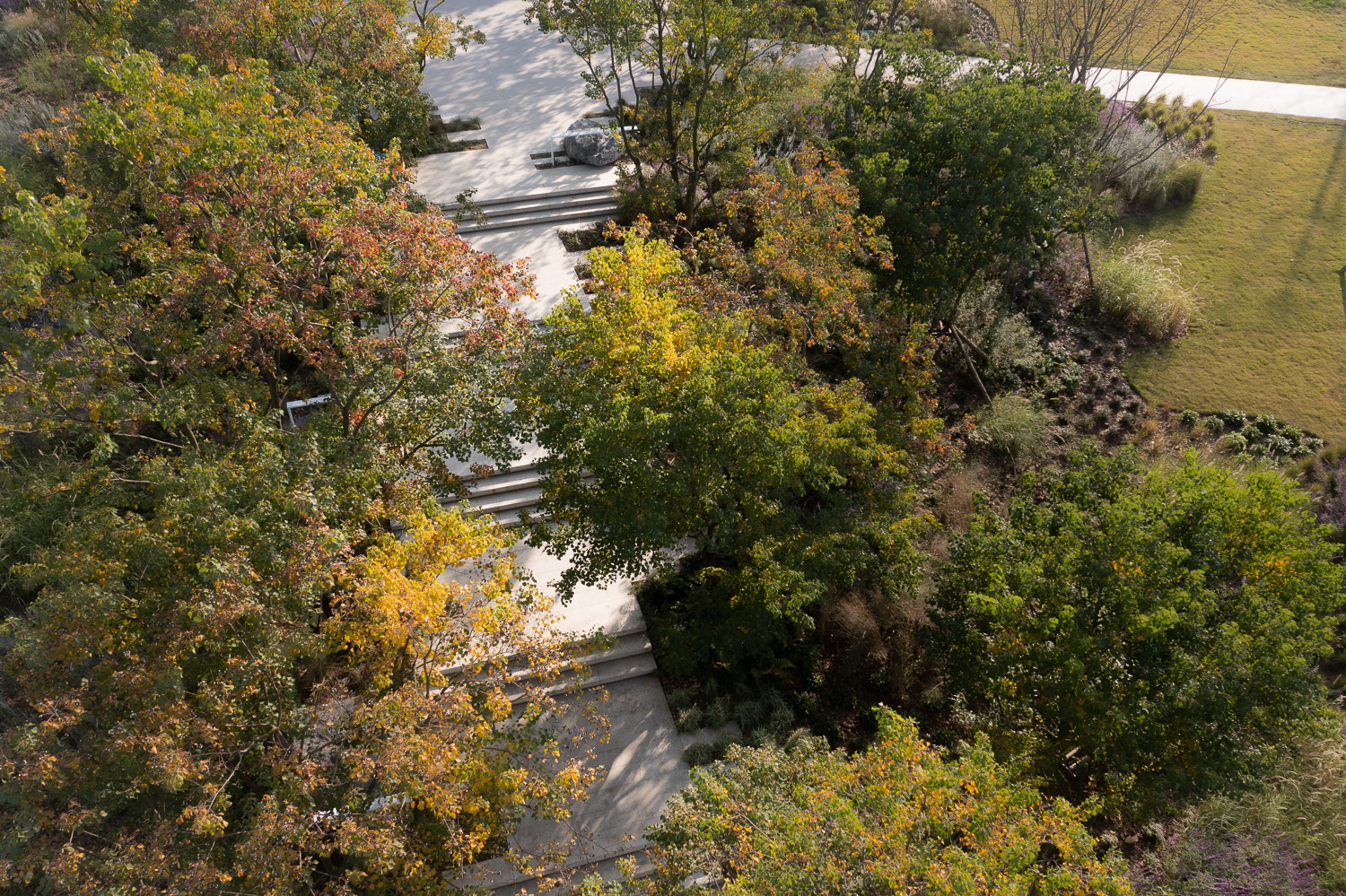
▲乌桕林掩映下的诗歌走廊
对岸际的改造彻底打开了水域空间。香蒲、再力花、鸢尾、菱白、灯芯草等挺水植物精致地点缀在驳岸及浅水区,打破原有刻板封闭岸际线,湖、坡相连,敞开空间,水波轻柔地漫上草甸,让亲水变得更简单。选取十多种莲花于内湾浅滩处进行适应性种植,找寻最佳生长形态及观赏效果。
The revampment of the shore completely hews out the water space. Cattail, Zaili flower, iris, rhombus, wick grass and other emergent plants are delicately embellished on the barge and shallow water areas, cutting off the original closed shoreline that is rather stereotyped. That aside, lake and slope intertwine with each other with a capacious space. The water waves gently flooding over the pasture, making it easier for visitors to be close to the water. More than 10 kinds of lotus flowers were culled for adaptive planting at the shallows of the inner bay to forage for the best growth form and ornamental effect.
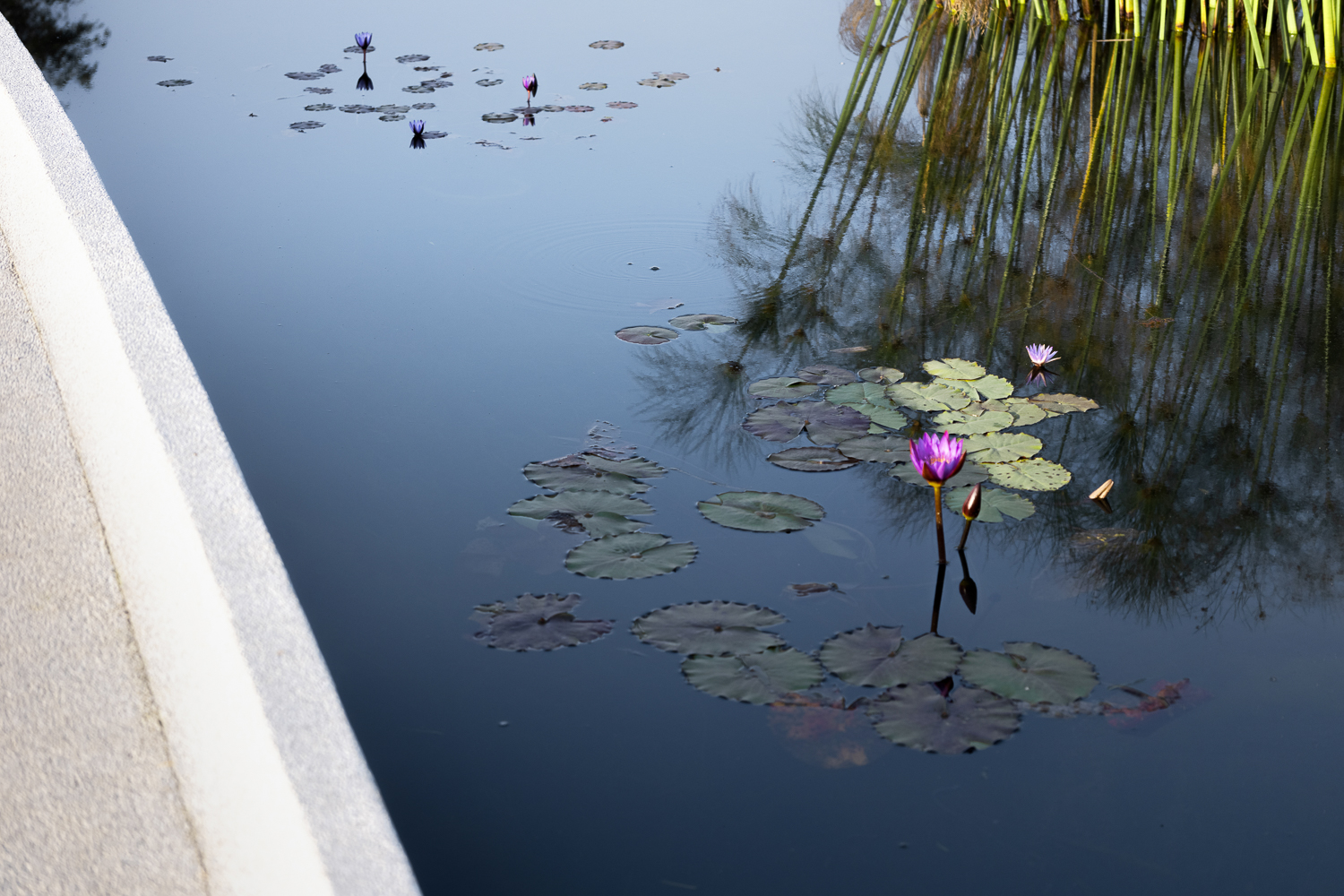
▲浮水植物
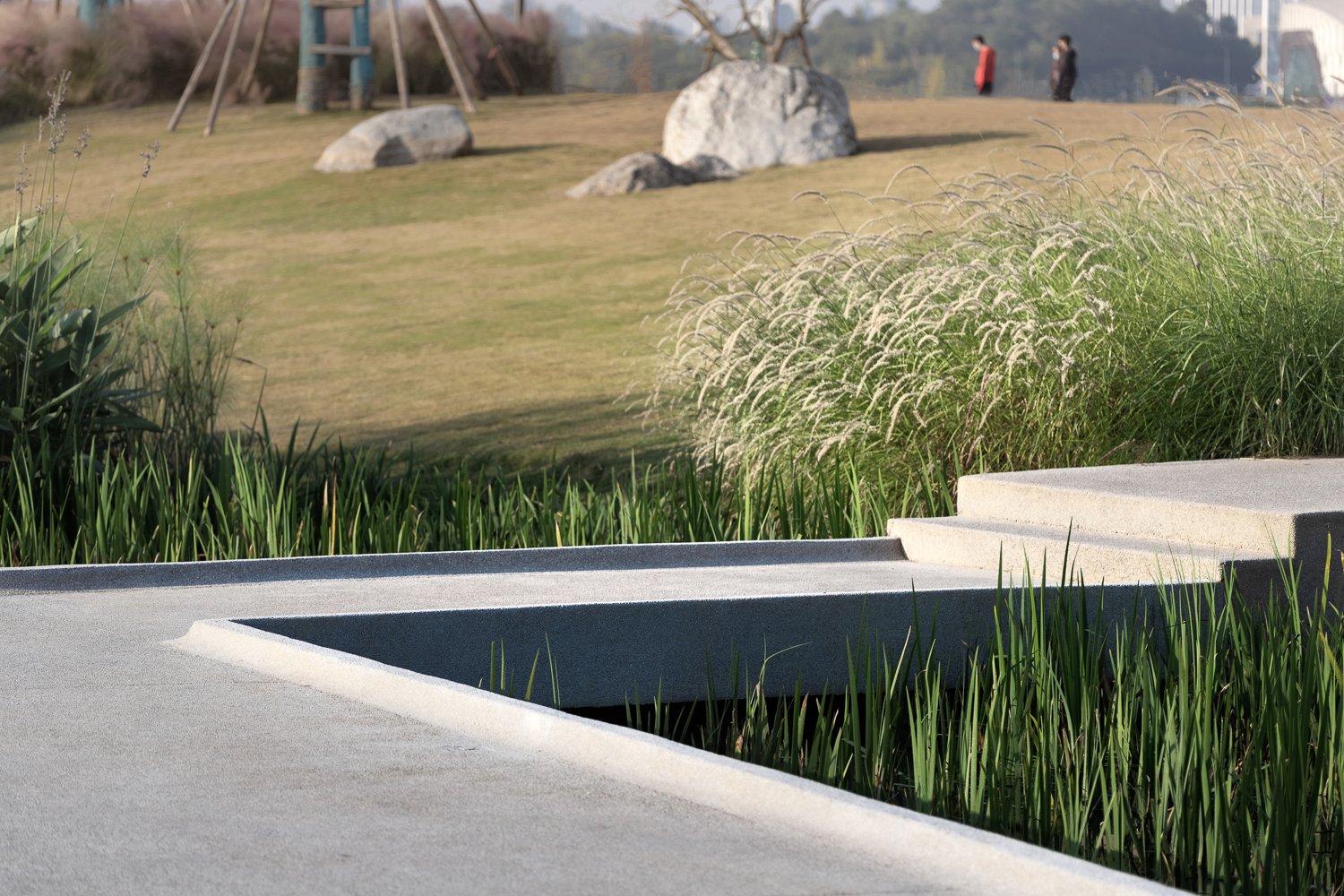
▲岸线挺水植物
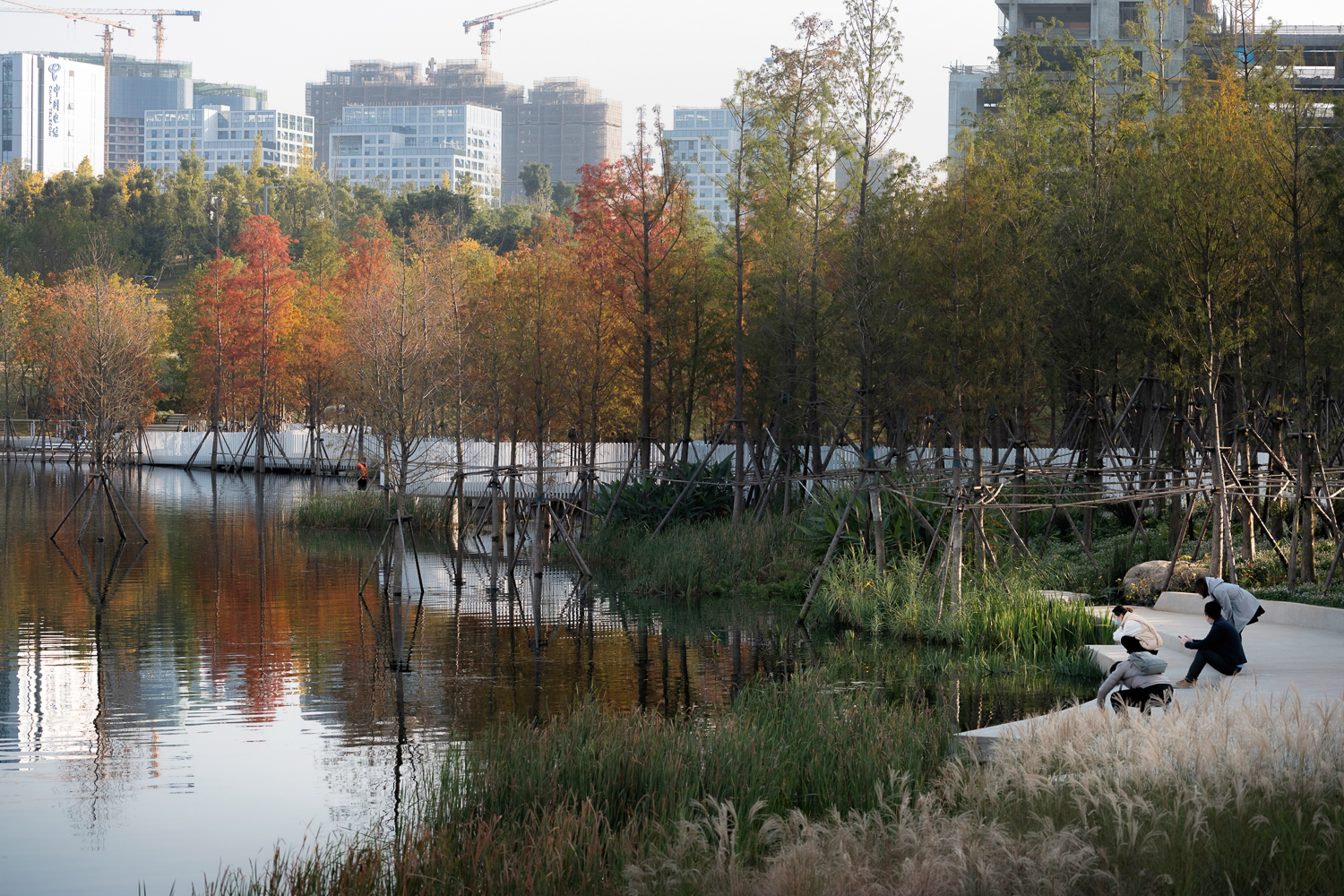
▲近岸生态群落系统的打造,拉近人与自然的距离
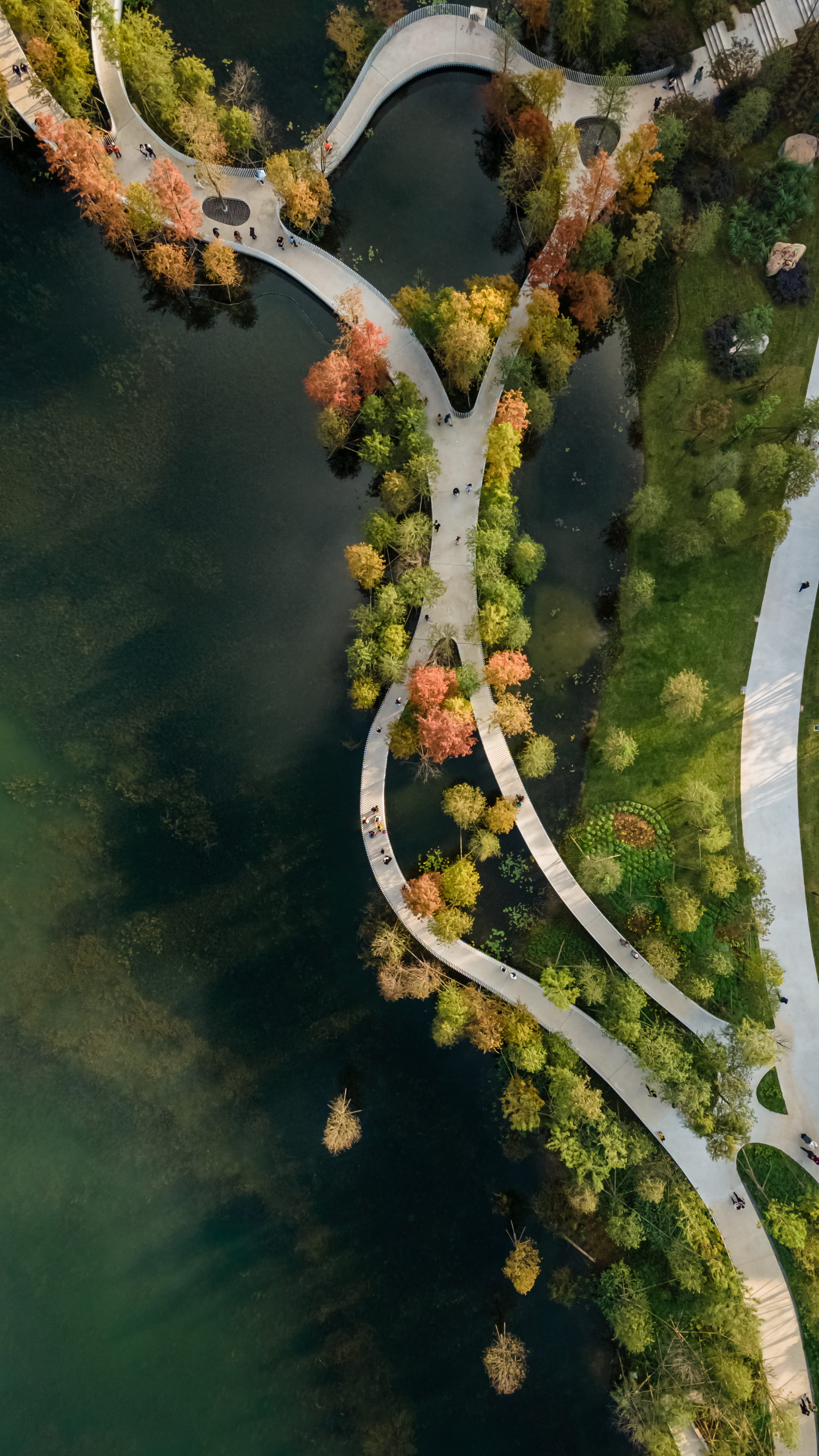
▲俯瞰白桥彩林
桥
Bridge
本次提升设计优化了游览路径,从林中蜿蜒而出的线型走廊,增加了游人亲水、近水的空间。
The design optimizes the track of visitors by a meandering linear promenade bridge by the lake, offering visitors more space to embrace the water.
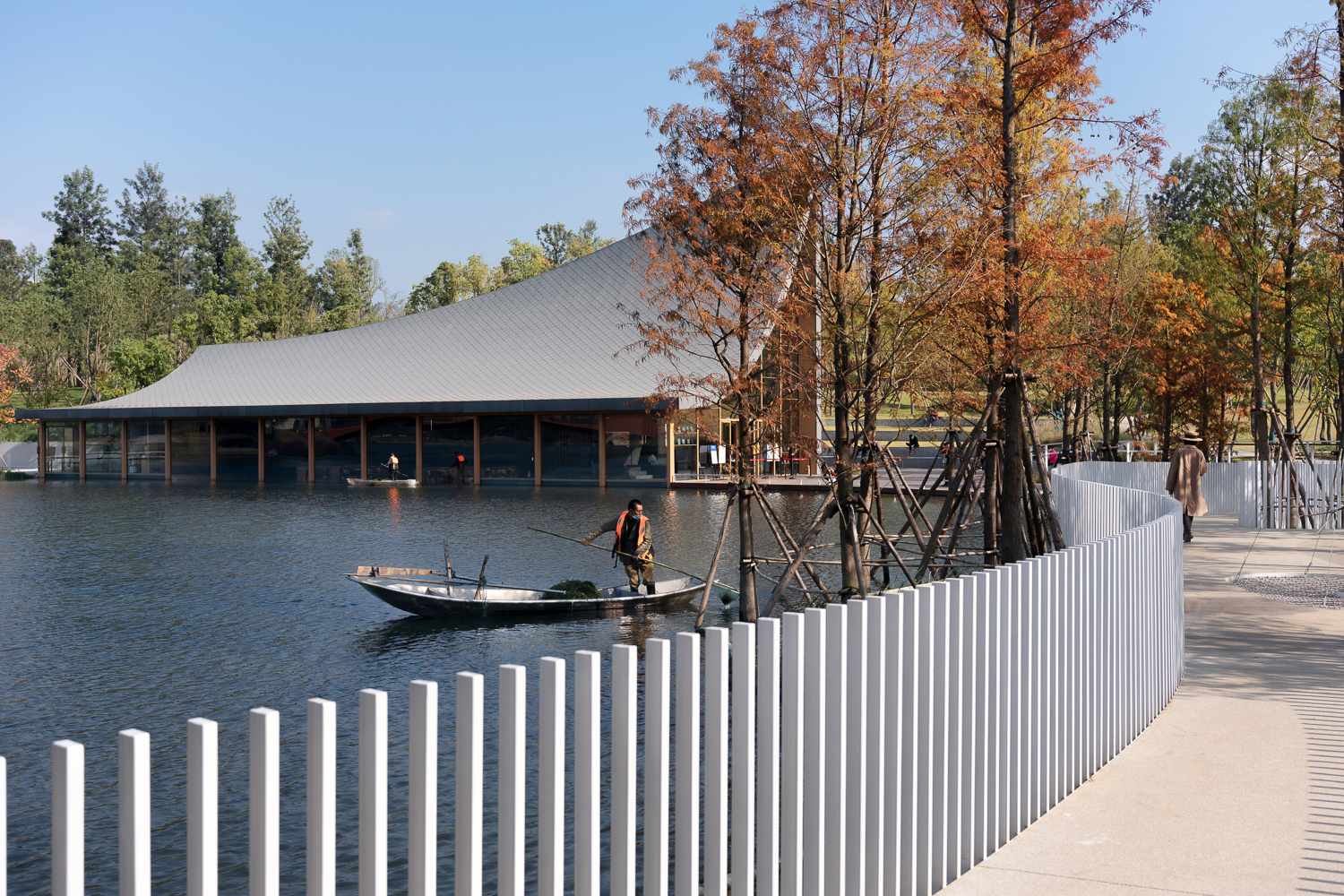
▲人行桥望向书店建筑
以湖畔书店两侧观水平台为起点,根据驳岸走向,在水面上向左右两侧分别构建两座廊桥,一高一低,隔水相望。左侧桥廊在落羽杉林中隐约蜿蜒,利用连接驳岸地形的高差,形成高低起伏的交织形态。排列式护栏脱离了常见护栏的封闭感,轻易就能触碰自然。
Starting from the water-viewing platforms on both sides of the lakeside bookstore, two covered bridges are built on the water surface to the left and right sides, respectively, in line with the edge of the barge, one higher in level and one lower, facing each other across the water. The bridge corridor on the left flank faintly meanders through the deciduous cedar forest, taking advantage of the height difference connecting the barge terrain to form an interweaving pattern of high and low. The arranged guardrail is free from the sense of closure of common one and visitors can easily touch the nature.
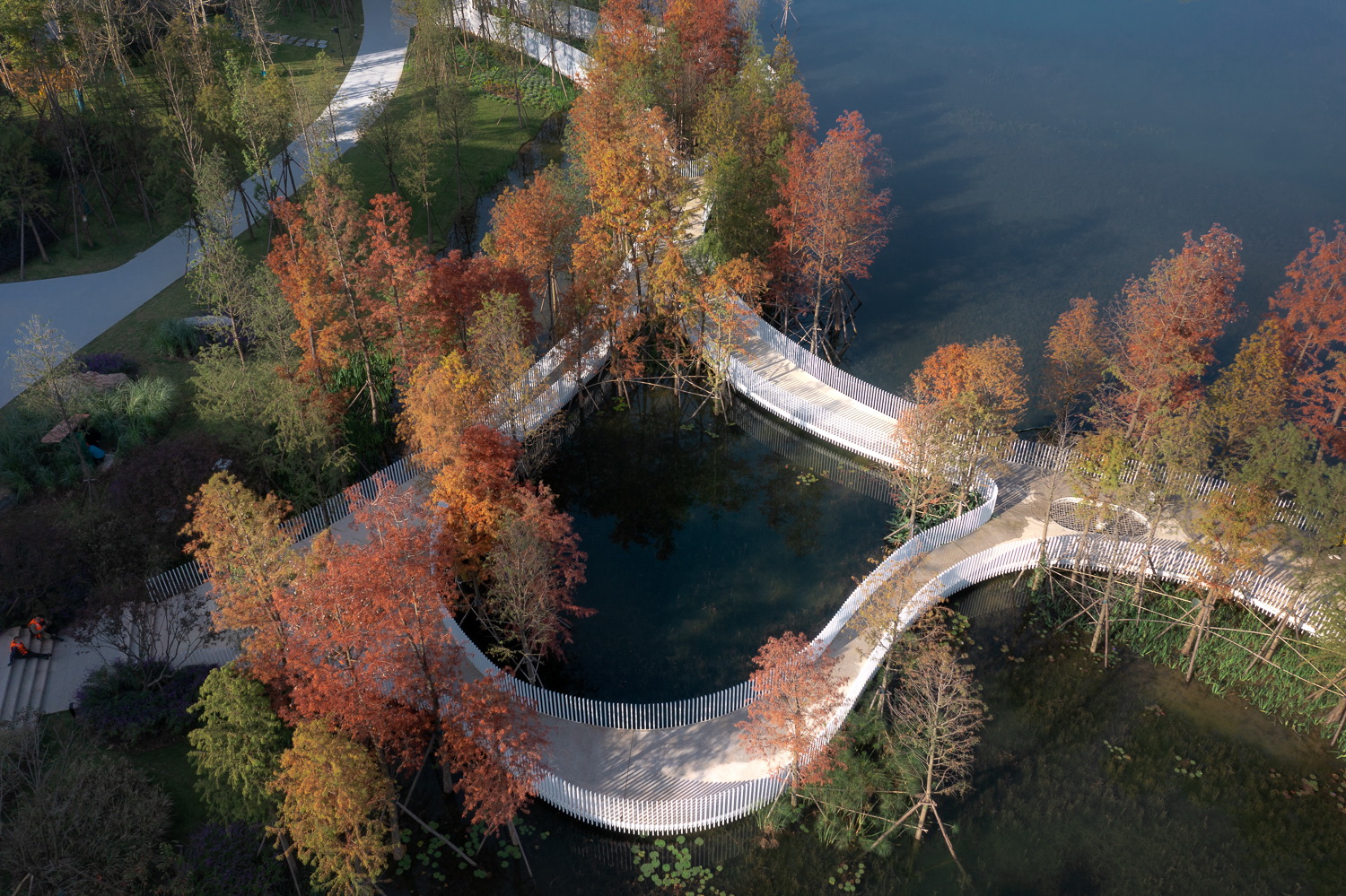
▲彩林与白桥相映成趣
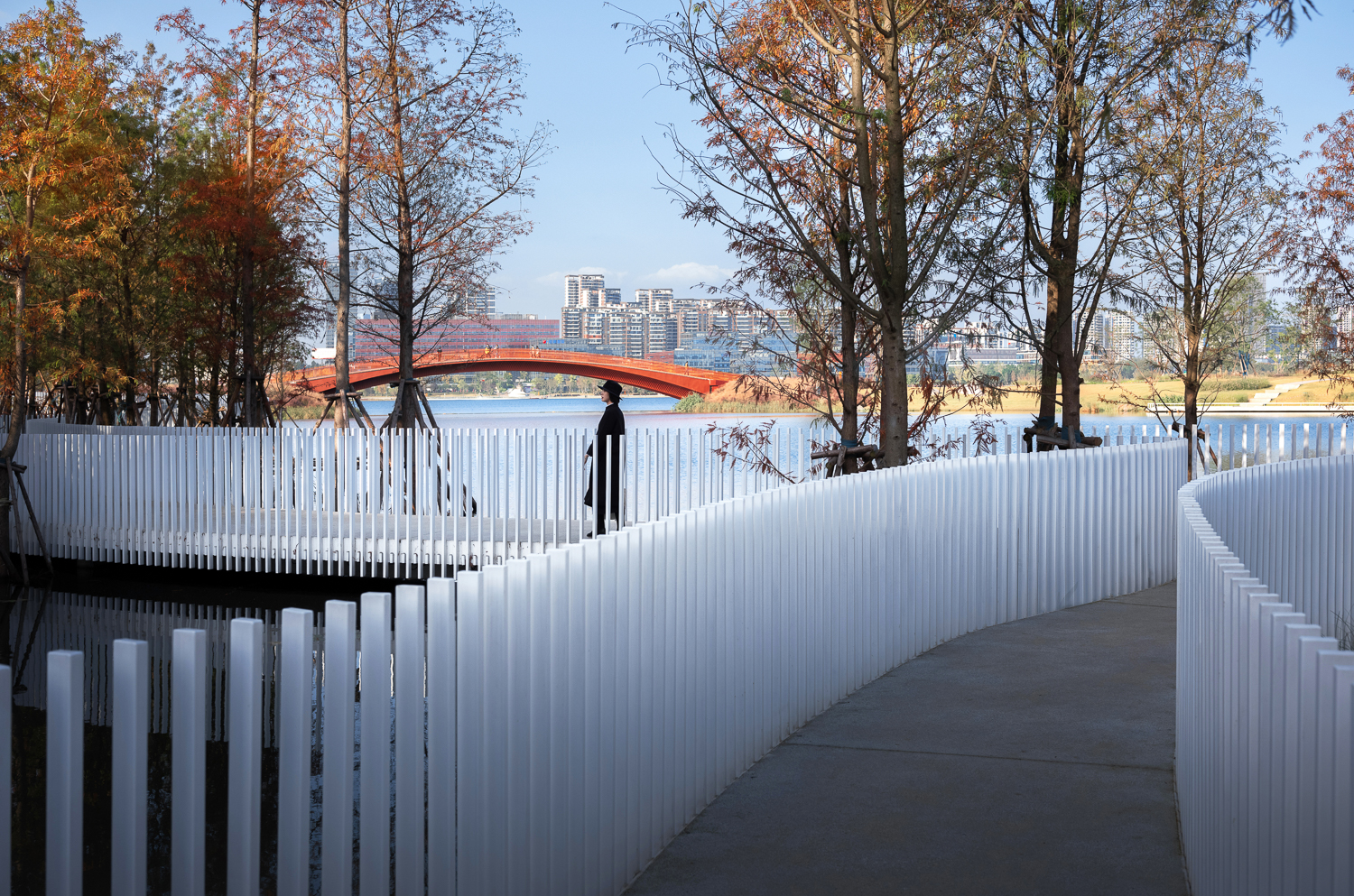
均匀温柔的栏杆侧壁照明是我们在设计过程中想到的于此区域最好的方式,设计起到补充环境光照的作用,并考虑在夜间照亮栏杆侧壁时避免对游人眼睛的直射。我们通过设计上反复研究和夜间实地实验,较为还原的实现了这一细节。
Homogeneous and gentle lighting of the railing sidewall was the best resort we designed in this area during the design process, which complemented the ambient light, and aimed to avoid direct exposure to the eye when the light illuminates the railing sidewall at night. We eventually achieved this detail through repeated research and conducting nighttime experiments.
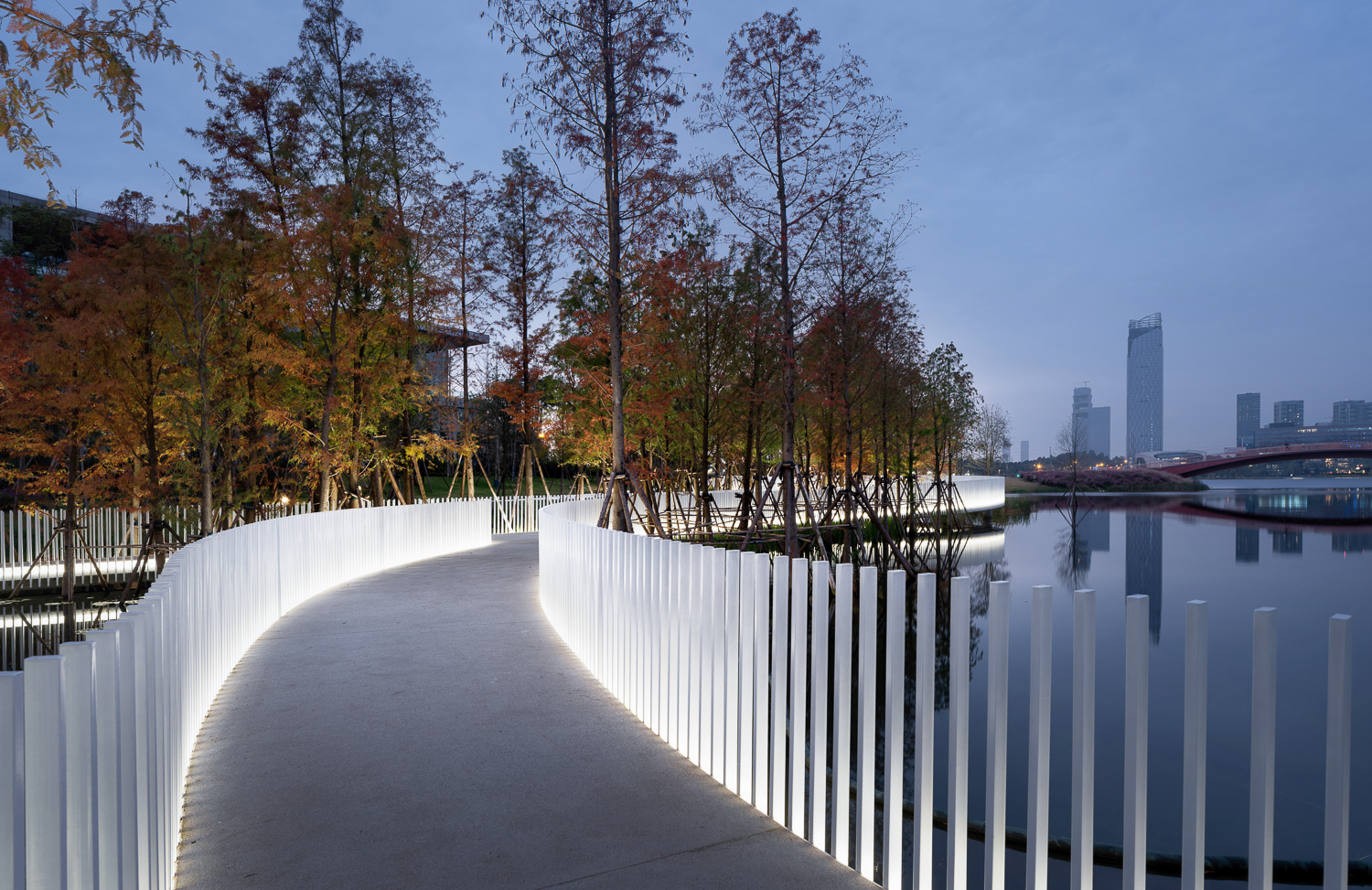
▲步行桥夜景
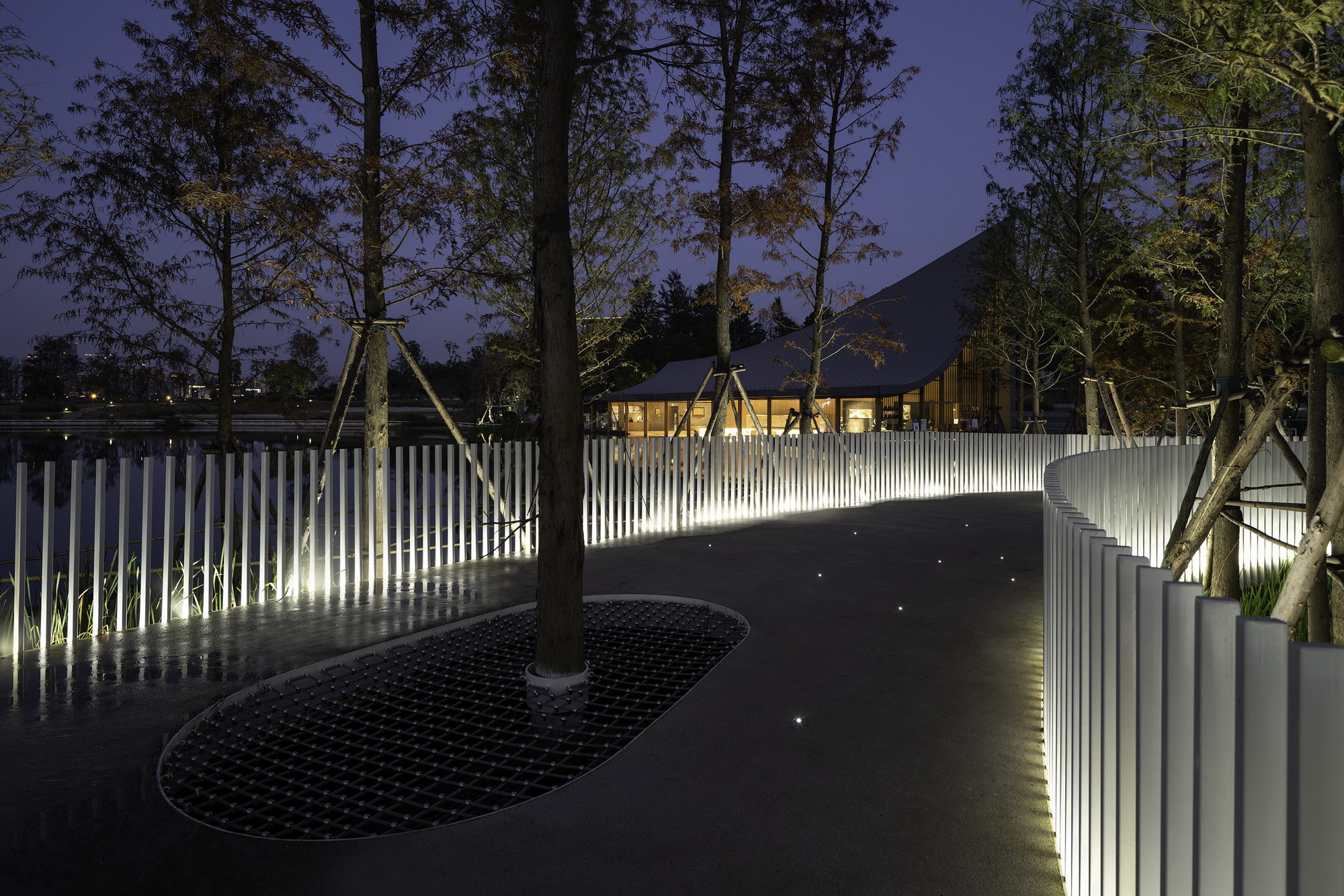
▲步行桥夜景
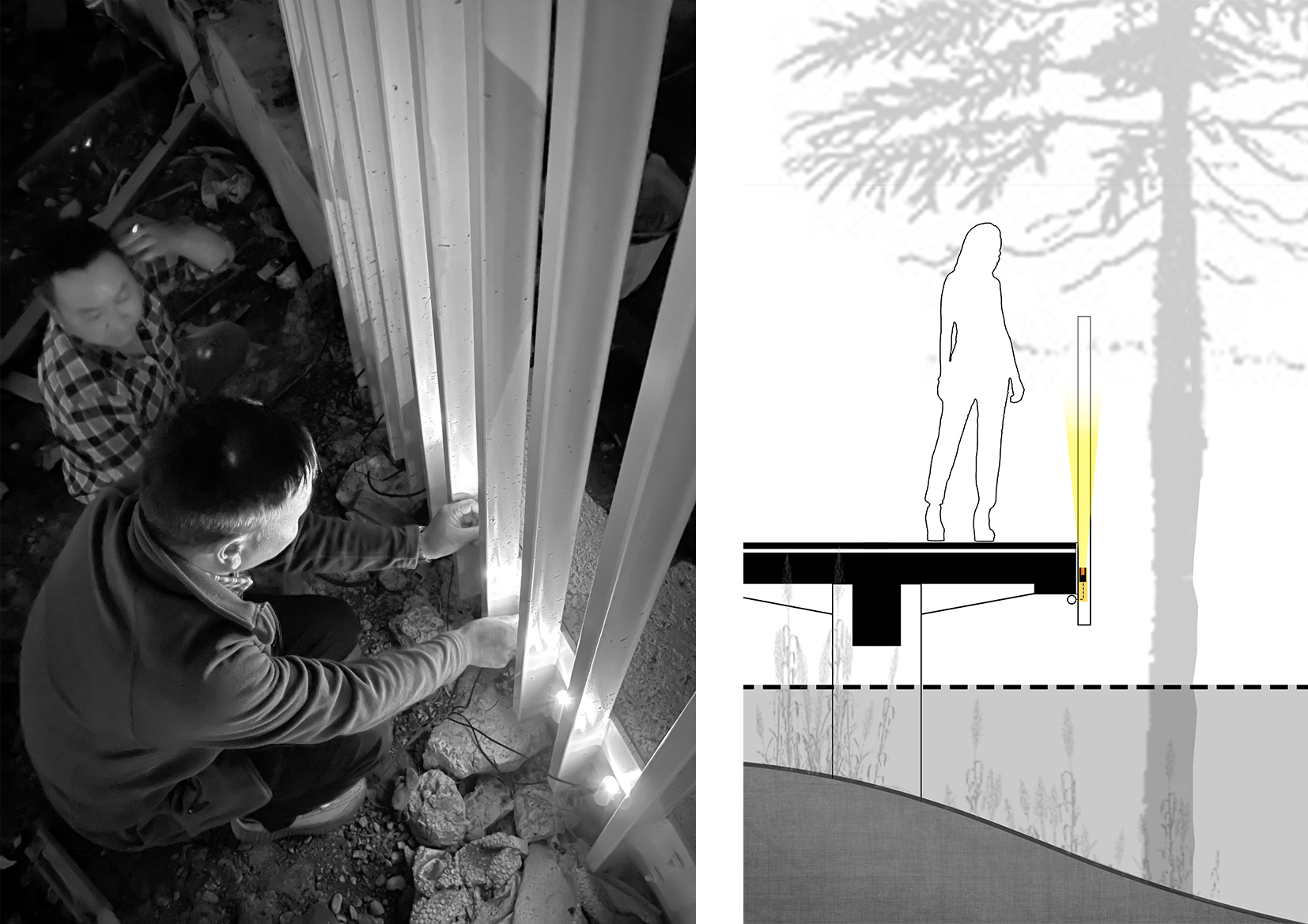
▲人行桥栏杆灯光实验
右侧桥廊从水面轻轻跃起,两座桥廊打破了固有的水陆格局,将陆生空间精妙地嵌入水面,实现了从观水到临水的突破。
The right flank of the bridge tips from the water, together with another side slashing the original configuration of land and lake, exquisitely imprinting the land view with the water, enabling visitor to closely embrace the water, rather than just admire it from the distant place.
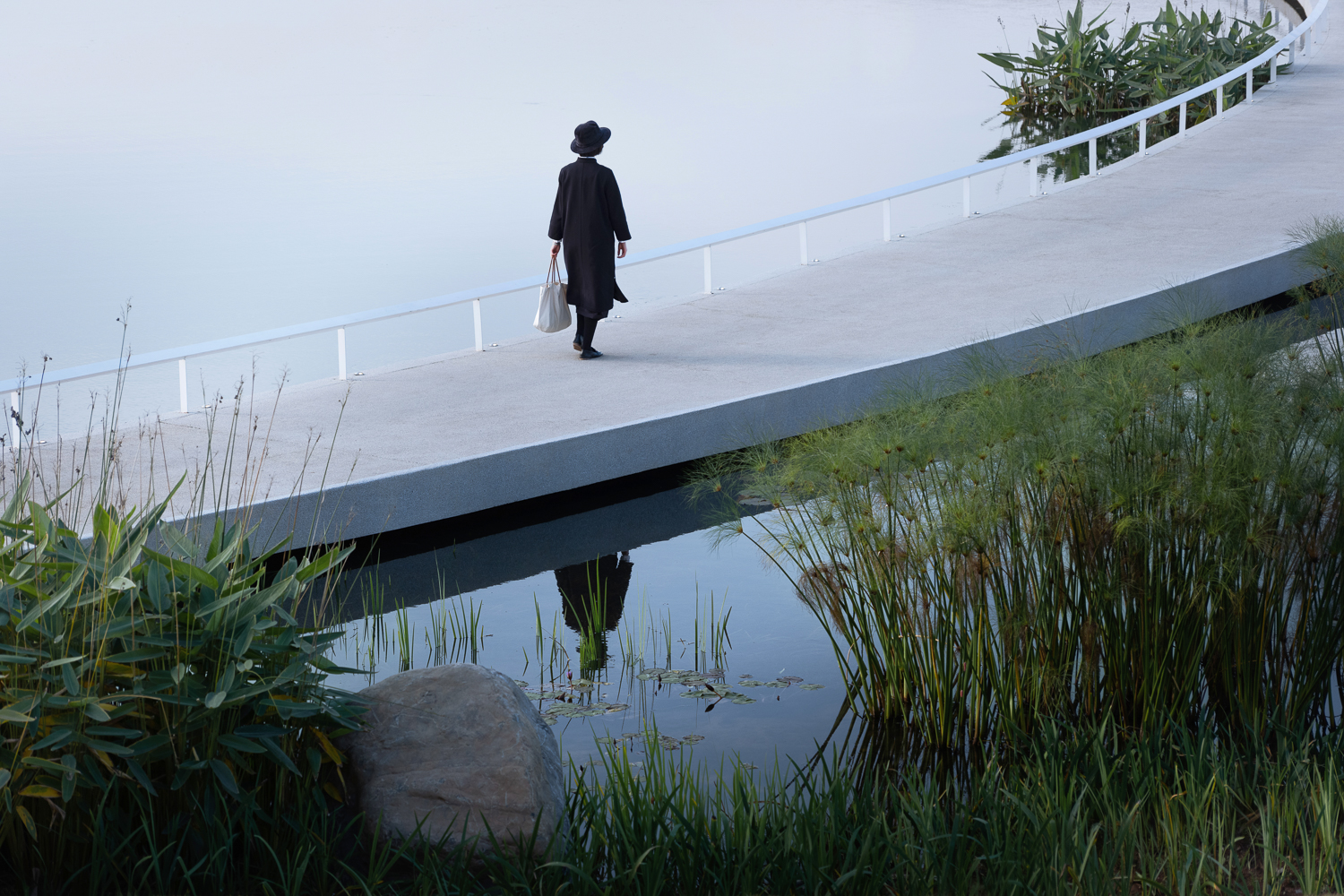
▲滨水栈桥
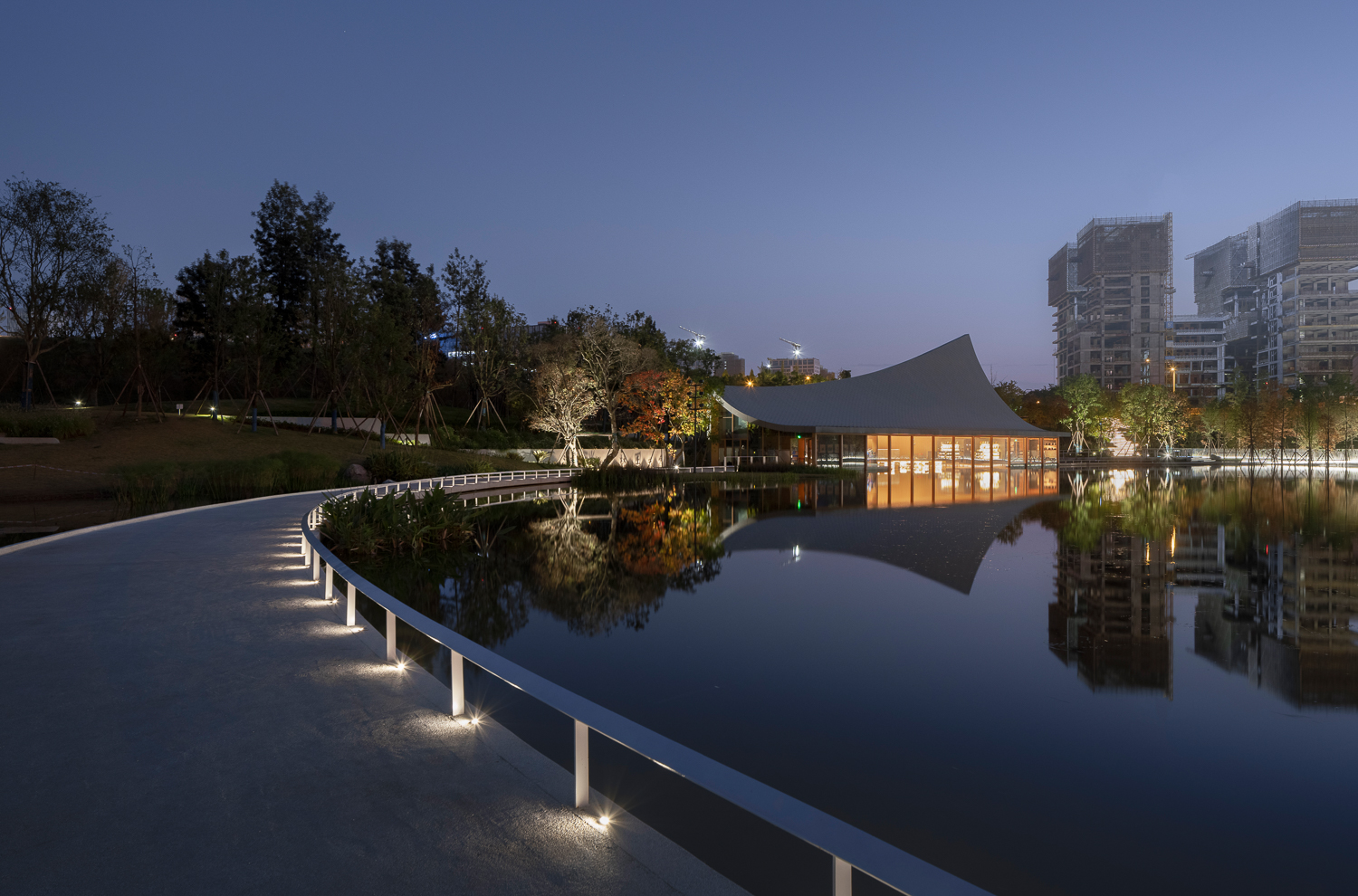
▲滨水栈桥夜景
设计团队摈弃传统生态修复的工程模式,在改善环境质量、恢复生态系统的基础上,充分阐释环境空间的可能性,修复环境与人的关系——打破固有的阅读空间定义,让阅读蔓延到整片森林,曲折蜿蜒的桥廊扩充了午后漫步的驻足点,轻柔平坦的草坡为周末家庭时光增添了生活之外的一丝野趣……从美学价值、社会价值等多个角度营造了一个更美、更包容、更亲近的生态空间,实现生态价值与人文价值的有机结合,为未来公园城市建设提供了可参考的范本。
The design team forgone the conventional engineering of ecological restoration. Rather, on the basis of improving environmental quality and restoring the ecosystem, they fully explicated the possibility of environmental space, restored the relationship between the environment and humankind - breaking the inherent definition of reading space, allowing reading to straggle over the entire forest. The winding bridge corridor enables visitors to have more places to rest for afternoon strolls, and the gentle and flat grassy slope added a touch of wilderness beyond life to the weekend family time... From multiple perspectives including aesthetic and social value, it fosters a more gorgeous, inclusive and intimate ecological space, realizing the organic combination of ecological and humanistic value, and providing a reference prototype for more city parks to be erected.
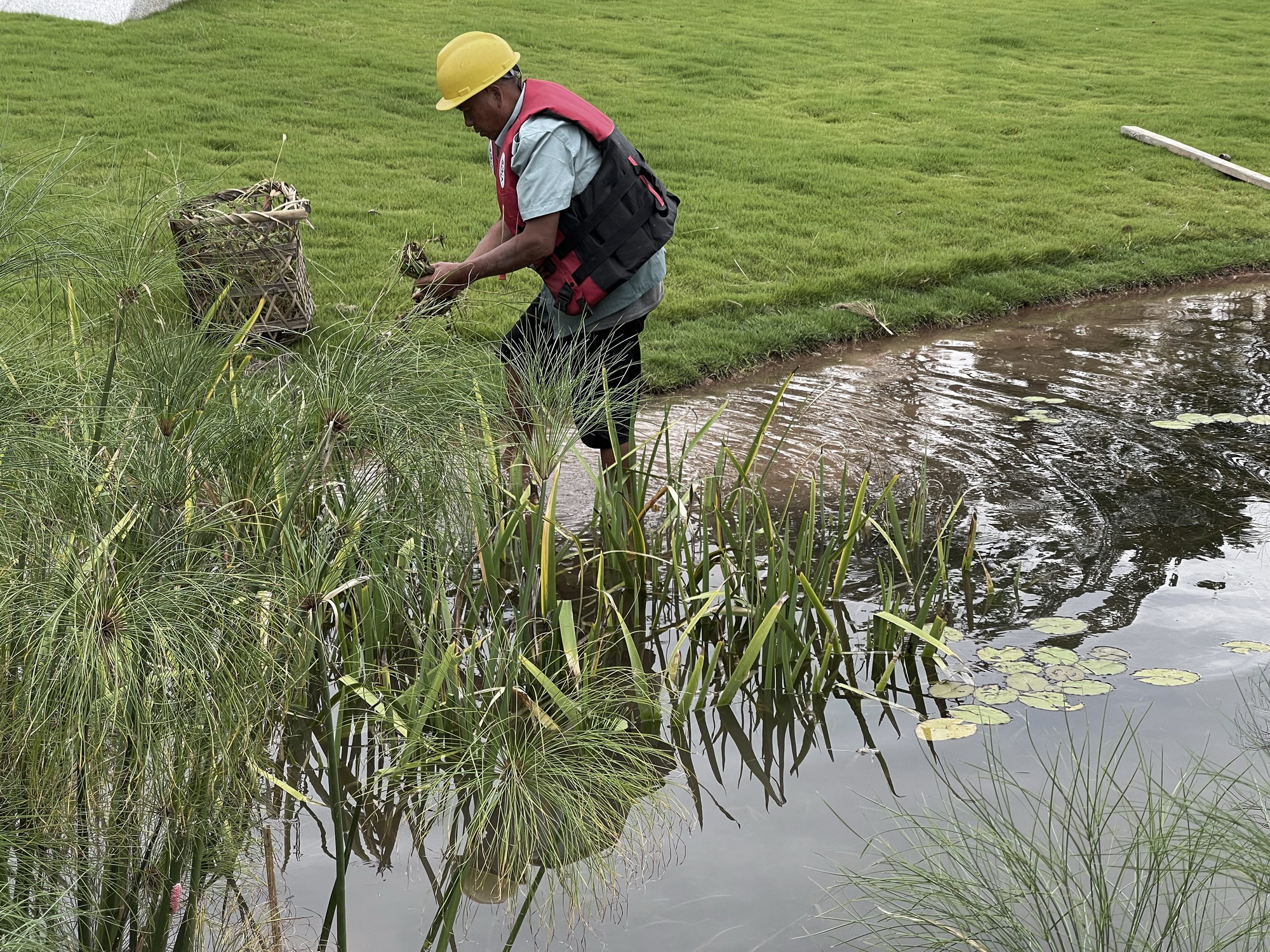
▲水生态治理施工现场
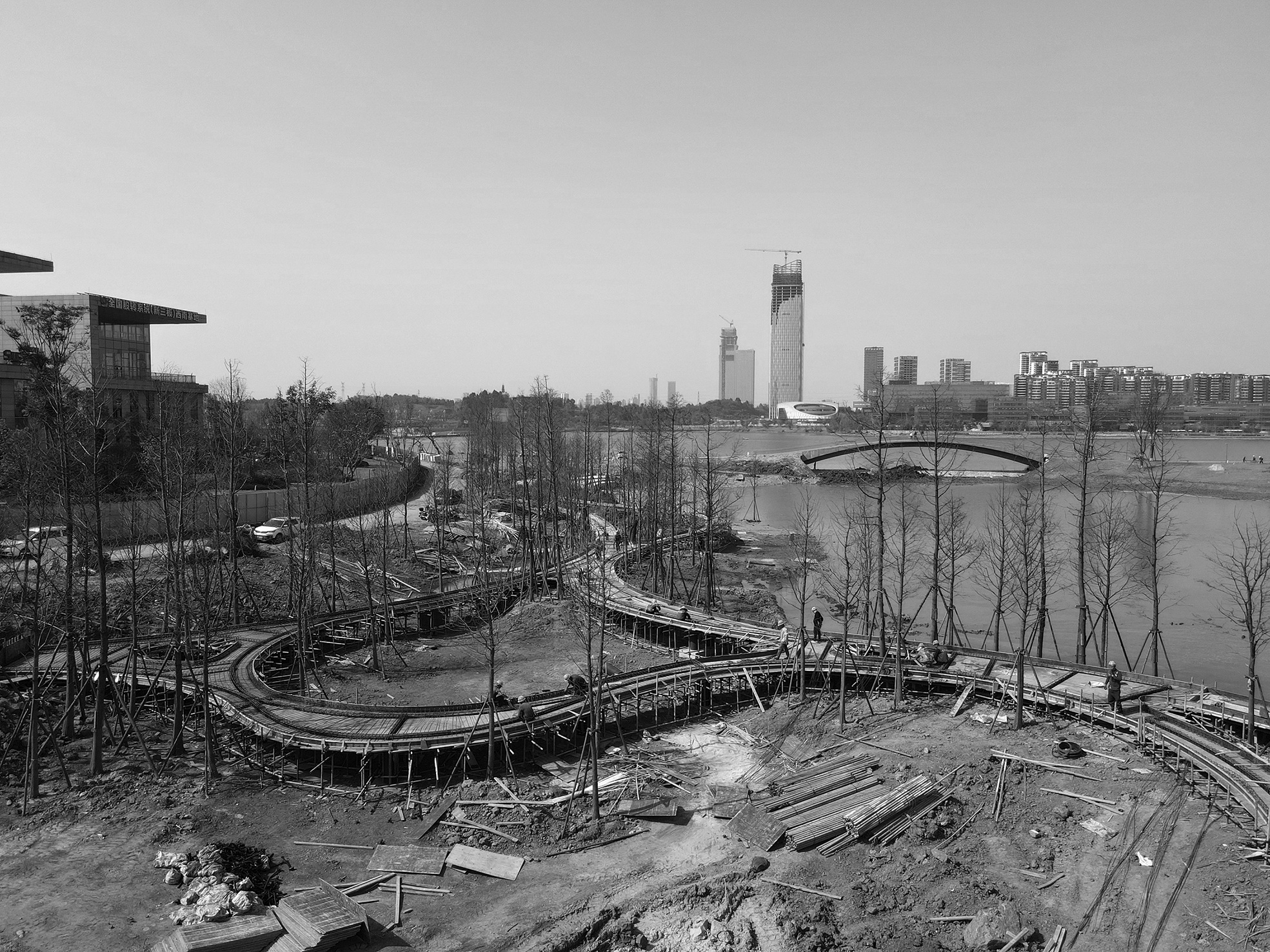
▲施工现场
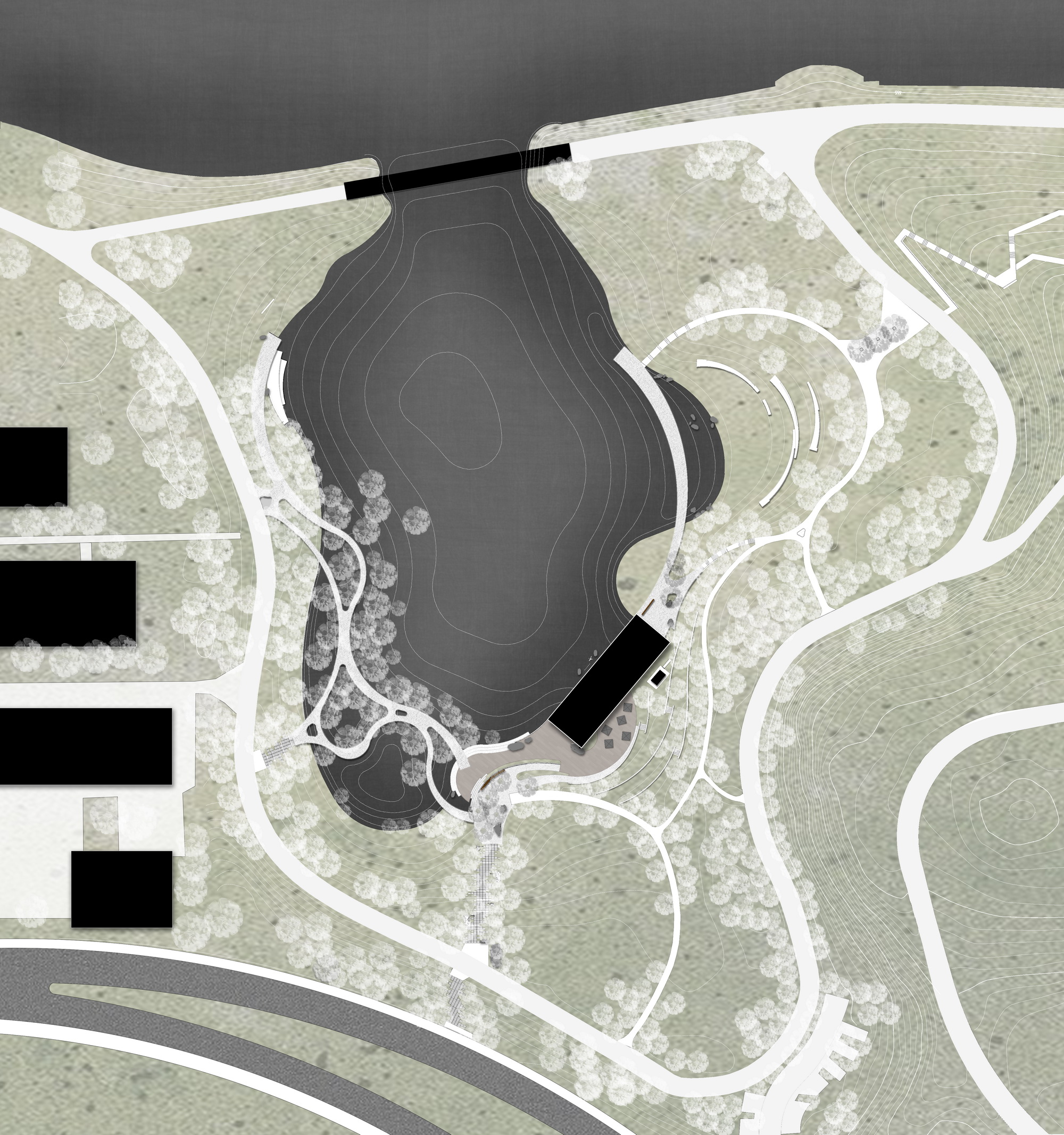
▲场地设计平面图
项目地址:成都·兴隆湖
项目面积:60000㎡
业主单位:成都天府新区投资集团有限公司
建设单位:成都建工
规划设计:中建西南设计院
示范段景观设计单位:YUDAOstudio昱道景观
设计及完成时间:2020-2021年
团队成员:龙昱杉 赵鑫源 周佳苹 段兴 朱雨橦 任文
人行桥结构设计:张哲
书店建筑设计:慕达建筑
景观设计管理:万华景观中心
湖区水生态治理:清源水环境
景观实施单位:华都农业 蜀人园林
花境单位:易境园艺
标识单位:远信华通
材料运用:水洗米石 花岗岩 钢板 仿清水混凝土漆 菠萝格木平台
摄影版权:河狸景观摄影 孙庆 昱道景观
Project Address: Xinglong Lake, Chengdu
Project Area: 60,000㎡
Owner Unit: Chengdu Tianfu Investment Group Co., Ltd
Construction Unit: Chengdu Construction Engineering
Planning and Design: China Construction Southwest Design Institute
Demonstration Section Landscape Design Unit: Yudao Landscape Design
Design and Completion time: 2020-2021
Design Team Members: Long Yushan, Zhao Xinyuan, Zhou Jiaping, Duan Xing, Zhu Yutong, Ren Wen
Structure Design of the Footbridge: Zhang Zhe
Bookstore Architectural Design: MUDA-Architects
Landscape Design Management: Wanhua Landscape Center
Water Ecological Governance in the Lake Area: Chengdu Qingyuan Water Environment Treatment Co., Ltd.
Landscape Implementation Unit: Huadu Agricultural Science Co., Ltd., Shuren Garden Co,. Ltd,
Flower border unit: Yijing Horticulture Co.,Ltd.
Identification unit: Yuanxin Huatong
Material Use: washed rice stone, granite, steel plate, imitation fair-faced concrete paint, pineapple lattice wood platform
Photography Copyright: Profile - Holi, Sun Qing, Yudao Landscape Design